Author: Ánh Nguyễn
เมื่อพูดถึงสัตว์กับใครสักคน คุณต้องเชี่ยวชาญคำศัพท์ สัตว์ภาษาอังกฤษ ด้วยนะ ดังนั้น อย่าปล่อยให้การสนทนาของคุณถูกขัดจังหวะเพียงเพราะมีคำศัพท์ไม่เพียงพอ เปิดโลกกว้างของสัตว์กับคำศัพท์สัตว์ภาษาอังกฤษที่พบบ่อยที่สุด ดังต่อไปนี้
คำศัพท์สัตว์ภาษาอังกฤษที่พบบ่อยที่สุด
คําศัพท์ภาษาอังกฤษหมวดสัตว์จะช่วยให้คุณเข้าสู่โลกของสัตว์ได้ง่ายและรวดเร็ว มาสร้างบทสนทนาที่น่าสนใจด้วยคลังคำศัพท์ภาษาอังกฤษสัตว์พร้อมข้อการถอดความต่อไปนี้ จำนวนคำค่อนข้างเยอะ คุณต้องมีเคล็ดลับจำคำศัพท์ภาษาอังกฤษที่ถูกต้องเพื่อเรียนรู้ได้เร็วที่สุดนะ
คำศัพท์ สัตว์ภาษาอังกฤษ เกี่ยวกับสัตว์เลี้ยง
- Cat /kæt/: แมว
- Kitten /ˈkɪt.ən/: ลูกแมว
- Dog /dɒg/: สุนัข
- Bitch /bɪtʃ/: นังตัวแสบ
- Puppy /ˈpʌp.i/: ลูกสุนัข
- Parrot /’pærət/: นกแก้ว
- Gecko /’gekou/: ตุ๊กแก
- Chinchilla /tʃin’tʃilə/: ชินชิล่า (ในอเมริกาใต้)
- Dalmatian /dælˈmeɪʃən/: ดัลเมเชี่ยน
- Guinea pig /ˈgɪni pig/: หนูตะเภา
- Hamster /’hæmstə/: หนูแฮมสเตอร์
- Rabbit /’ræbit/: กระต่าย
- Bird /bə:d/: นก
- Ferret /’ferit/: คุ้ยเขี่ย
- Betta fish (fighting fish) /ˈbɛtə fiʃ/: ปลากัด

คำศัพท์ สัตว์ภาษาอังกฤษ เกี่ยวกับนก
- Bird: นกทั่วไป
- Pheasant /ˈfɛznt/ ไก่ฟ้า
- Swallow /ˈswɒləʊ/ นกนางแอ่น
- Canary /kəˈneəri/ นกขมิ้น
- Pigeon /ˈpɪʤɪn/ พิราบ
- Parrot /ˈpærət/ นกแก้ว
- Crow /krəʊ/ อีกา
- Hummingbird /ˈhʌmɪŋbɜːd/ นกฮัมมิงเบิร์ด
- Raven /ˈreɪvn/ อีกา
- Quail /kweɪl/ นกกระทา
- Kingfisher /ˈkɪŋˌfɪʃə/ นกกระเต็น
- Swan /swɒn/ หงส์
- Woodpecker /ˈwʊdˌpɛkə/ นกหัวขวาน
- Toucan /ˈtuːkən/ นกทูแคน
- Sparrow /ˈspærəʊ/ กระจอก
- Peacock /ˈpiːkɒk/ สาธารณะ
- Penguin /ˈpɛŋgwɪn/ เพนกวิน
- Ostrich /ˈɒstrɪʧ/ นกกระจอกเทศ
- Seagull /ˈsiːgʌl/ นกนางนวล
- Eagle /ˈiːgl/ นกอินทรี
- Flamingo /fləˈmɪŋgəʊ/ นกฟลามิงโก
- Hawk /hɔːk/ นกฟลามิงโก
- Stork /stɔːk/ นกกระสา
- Falcon /ˈfɔːlkən/ ฟอลคอน
- Vulture /ˈvʌlʧə/ อีแร้ง
- Hawk /hɔ:k/ เหยี่ยว, นกเหยี่ยว
- Hen /hen/ แม่ไก่
- Hummingbird /’hʌmiɳ /bə:d/ นกฮัมมิงเบิร์ด
- Ostrich /’ɔstritʃ/ นกกระจอกเทศ
- Owl /aul/ นกฮูก
- Parrot /’pærət/ นกแก้ว
- Peacock /’pi:kɔk/ นกยูง
- Pelican /’pelikən/ นกกระทุง
- Petrel /’petrəl/ นกนางนวลเพเรน (ตัวเล็ก)

คำศัพท์สัตว์ภาษาอังกฤษ เกี่ยวกับสัตว์ทะเล/สัตว์ใต้น้ำ
- Crab /kræb/ ปู
- Seal /siːl/ ซีล
- Octopus /ˈɒktəpəs/ ปลาหมึกยักษ์
- Shark /ʃɑːk/ ฉลาม
- Seahorse /ˈsiːhɔːs/ ม้าน้ำ
- Walrus /ˈwɔːlrəs/ วัวช้างทะเล
- Starfish /ˈstɑːfɪʃ/ ปลาดาว
- Whale /weɪl/ วาฬ
- Penguin /ˈpɛŋgwɪn/ เพนกวิน
- Squid /skwɪd/ ปลาหมึก
- Lobster /ˈlɒbstə/ ล็อบสเตอร์
- Shrimp /ʃrɪmp/ กุ้ง
- Coral /ˈkɒrəl/ ปะการัง
- Seaweed /ˈsiːwiːd/ สาหร่ายทะเล
- Clam /klæmz/ หอย
- Sentinel crab /ˈsɛntɪnl kræb/ ปูก้ามหัก
- Dolphin /ˈdɒlfɪn/ ปลาโลมา
- Mussel /ˈmʌsl/ หอยแมลงภู่
- Oyster /ˈɔɪstə/ หอยนางรม
- Scallop /ˈskɒləp/ หอยเชลล์
- Goldfish /ˈgəʊldfɪʃ/ ปลาทอง
- Salmon /ˈsæmən/ แซลมอน
- Sea snail /siː/ /sneɪl/ หอยทากทะเล
- Sea urchin /siː/ /ˈɜːʧɪn/ เม่นทะเล
- Sea turtle /siː/ /ˈtɜːtl/ เต่าทะเล
- Sea lion /siː/ /ˈlaɪən/ สิงโตทะเล
- Salamander /ˈsæləˌmændə/ ซาลาแมนเดอร์
- Hippopotamus /ˌhɪpəˈpɒtəməs/ ฮิปโป
- Fish /fɪʃ/ ปลา
- Clownfish /ˈklaʊnfɪʃ/ ปลาการ์ตูน
- Common carp /ˈkɒmən kɑːp/ ปลาคาร์พ
- Crocodile /ˈkrɒkədaɪl/ จระเข้
- Anchovy /ˈænʧəvi/ ปลากะตักทะเล
- Sperm whale /spɜːm weɪl/ วาฬสเปิร์ม
- Catfish /ˈkætˌfɪʃ/ ปลาดุก
- Mackerel /ˈmækrəl/ ปลาทู
- Pomfret /ˈpɒmfrɪt/ ปอมเฟรต
- Eel /iːl/ ปลาไหล
- Flounder /ˈflaʊndə/ ปลาลิ้นหมา
- Goby /ˈɡəʊbi/ ปลาบู่
- Herring /ˈhɛrɪŋ/ ปลาเฮอริ่ง
- Catfish /ˈkætfɪʃ/ ปลาดุก
- Tench /tentʃ/ เทนช์
- Tilapia /tɪˈlɑːpiə/ ปลานิล
- Pufferfish /ˈpʌfəfɪʃ/ ปลาปักเป้า
- Suckermouth catfish /ˈsʌkəmaʊθ ˈkatfɪʃ/ ปลาดุกดูดปาก
- Red tilapia /rɛd tɪˈleɪpɪə/ ปลานิลแดง
- Swordfish /ˈsɔːdfɪʃ/ ปลากระโทงดาบ
- Stingray /ˈstɪŋreɪ/ ปลากระเบน
- Tuna /ˈtjuːnə/ ทูน่า
- Anabas /ˈanəbəs/ อนาบัส
- Flowerhorn /ˈflaʊəhɔːn/ ฟลาวเวอร์ฮอร์น
- Sardine /sɑːˈdiːn/ ปลาซาร์ดีน
- Snakehead fish /ˈsneɪkhɛd fɪʃ/ ปลาช่อน
- Angelfish /ˈeɪndʒ(ə)lfɪʃ/ ปลาเทวดา
- Alligator /ˈælɪgeɪtə/ จระเข้อเมริกัน
- Sea snake /siː sneɪk/ งูทะเล
- Frog /frɒg/ กบ
- Jellyfish /ˈdʒel.i.fɪʃ/: แมงกะพรุน
- Killer whale /ˈkɪl.əʳ weɪl/: วาฬขาวดำตัวเล็ก
- Seal /siːl/: แมวน้ำ
- Squid /skwɪd/: ปลาหมึก
คำศัพท์ สัตว์ภาษาอังกฤษ เกี่ยวกับสัตว์ป่า
- Bear /beə/ หมี
- Polar bear /ˈpəʊlə beə/ หมีขั้วโลก
- Panda /ˈpændə/ แพนด้า
- Tiger cub /ˈtaɪgə kʌb/ ลูกเสือ
- Lion /ˈlaɪən/ สิงโต
- Lioness /ˈlaɪənes/ สิงโตตัวเมีย
- Lion cub /ˈlaɪən kʌb/ ลูกสิงโต
- Tiger /ˈtaɪgə/ เสือ
- Tigress /ˈtaɪɡrəs/ เสือโคร่ง
- Panther /ˈpænθə/ เสือดำ
- Leopard /ˈlɛpəd/ เสือดาว
- Cheetah /ˈʧiːtə/ เสือชีต้า
- Gazelle /ɡəˈzel/ แอนทีโลป
- Rhinoceros /raɪˈnɒsərəs/ แรด
- Fox /fɒks/ จิ้งจอก
- Fawn /fɔːn/ ลูกกวาง
- Reindeer /ˈreɪndɪə/ กวางเรนเดียร์
- Elk /ɛlk/ กวางใหญ่ชนิดหนึ่ง
- Moose /muːs/ กวางขนาดใหญ่ที่มีเขาแบน
- Rat /ræt/ หนู
- Elephant /ˈɛlɪfənt/ ช้าง
- Wolf /wʊlf/ หมาป่า
- Deer /dɪə/ กวาง
- Doe /dəʊ/ กวางตัวเมีย
- Giraffe /ʤɪˈrɑːf/ ยีราฟ
- Frog /frɒg/ กบ
เข้าใจแนวทางการใช้กาลต่างๆในภาษาอังกฤษอย่างมั่นคง:
- ประโยคอดีตกาลต่อเนื่อง (Past Continuous Tense): โครงสร้างและแบบฝึกหัด
- ประโยคอนาคตกาล ( Future Simple Tense ): โครงสร้างและแบบฝึกหัด
- Present Continuous Tense: โครงสร้าง หลักการใช้งาน
- Past Perfect Continuous Tense
- ประโยคปัจจุบันกาล (Present Simple Tense): โครงสร้าง การใช้งาน
- อนาคตกาลสมบูรณ์ต่อเนื่อง (Future Perfect Continuous Tense)
- Future Continuous Tense: โครงสร้างและหลักการใช้งาน
- Snake /sneɪk/ งู
- Alligator /ˈælɪgeɪtə/ จระเข้
- Crocodile /ˈkrɒkədaɪl/ จระเข้
- Bat /bæt/ ค้างคาว
- Gorilla /gəˈrɪlə/ กอริลลา
- Giant panda /ˈʤaɪənt ˈpændə/ แพนด้า
- Boar /bɔː/ หมูป่า
- Koala /kəʊˈɑːlə/ โคอาลา
- Camel /ˈkæməl/ อูฐ
- Sloth /sləʊθ/ สลอธ
- Hyena /haɪˈiːnə/ ไฮยีน่า
- Chimpanzee /ˌʧɪmpənˈziː/ ชิมแปนซี
- Zebra /ˈziːbrə/ ม้าลาย
- Squirrel /ˈskwɪrəl/ กระรอก
- Baboon /bəˈbuːn/ ลิงบาบูน
- Monkey /ˈmʌŋki/ ลิง
- Racoon /rəˈkuːn/ แรคคูน
- Platypus /ˈplætɪpəs/ ตุ่นปากเป็ด
- Otter /ˈɒtə/ นาก
- Skunk /skʌŋk/ สกั๊งค์
- Chimpanzee /ˌʧɪmpənˈziː/: ชิมแปนซี
- Badger /ˈbæʤə/ แบดเจอร์
- Weasel /ˈwiːzl/ พังพอน
- Kangaroo /ˌkæŋgəˈru/: จิงโจ้
- Hedgehog /ˈhɛʤhɒg/: เม่น (กินเนื้อ)
- Porcupine /ˈpɔːkjʊpaɪn/: เม่น (กินพืชเป็นอาหาร)
- Gazelle /gəˈzel/: ละมั่ง
- Cheetah /ˈtʃiː.tə/: เสือชีต้า
- Gnu /nuː/: วิลเดอบีสต์
คำศัพท์สัตว์ภาษาอังกฤษ เกี่ยวกับสัตว์เลี้ยง/ฟาร์ม
- Sheep /ʃiːp/ แกะ
- Donkey /ˈdɒŋki/ ลา
- Goat /gəʊt/ แพะ
- Cow /kaʊ/ วัว
- Buffalo /ˈbʌfələʊ/ ควาย
- Goose /guːs/ ห่าน
- Horse /hɔːs/ ม้า
- Dalf /kæf/ ลูกวัว
- Duck /dʌk/ เป็ด
- drake /dreɪk/ เป็ดตัวผู้
- Duckling /ˈdʌklɪŋ/ ลูกเป็ด
- Chicken /ˈʧɪkɪn/ ไก่
- Rooster /ˈruːstə/ ไก่ตัวผู้
- Hen /hɛn/ ไก่ตัวเมีย
- Turkey /ˈtɜːki/ ไก่งวง
- Piglet /ˈpɪglət/ ลูกหมู
- Rabbit /ˈræbɪt/ กระต่าย
- Ox /ɒks/ วัว
- Water buffalo /ˈwɔːtə ˈbʌfələʊ/ ควายน้ำ
- Pig /pɪg/ หมู
- Bunny /ˈbʌni/ ลูกกระต่าย
- Earthworm /ɜːθ wɜːm/ ไส้เดือน
- Cattle /ˈkætl/ โค
- Dog dɔːɡ/ สุนัขเพศผู้
- Puppy /ˈpʌpi/ ลูกหมา
- Queen /kwiːn/ แมวตัวเมีย
- Kitten /ˈkɪtn/ ลูกแมว
- Cat /kæt/ แมว
- Sheep /ʃiːp/: แกะ
- Dairy cow /ˈdeə.ri kaʊ/: โคนม
- Horses /hɔːsiz/: ม้า
- Paѕture /ˈpɑːѕ.tʃəʳ/: ทุ่งเลี้ยงสัตว์
- Farmer /ˈfɑː.məʳ/: ชาวนา เจ้าของฟาร์ม
- Barnуard /ˈbɑːn.jɑːd/: ปศุสัตว์
- Cattle /ˈkæt.ļ/: (ฝูง) ปศุสัตว์
- Coᴡboу /ˈkaʊ.bɔɪ/: เด็กเลี้ยงวัว
- Coᴡgirl /ˈkaʊ.gɜːl/: สาวเลี้ยงวัว
คำศัพท์ สัตว์ภาษาอังกฤษ เกี่ยวกับแมลง
ใน สัตว์ภาษาอังกฤษ คำศัพท์เกี่ยวกับแมลงมีหลากหลายมาก คุณสามารถเรียนรู้ตามหัวข้อแมลงมีปีกหรือไม่มีปีก แบบนี้จะทำให้จำได้ง่ายกว่า
แมลงไม่มีปีก
| คำศัพท์ | ความหมาย |
| Ant /ænt/ | มด |
| Fire ant /faɪə ænt/ | มดคันไฟ |
| Rove beetle /rəʊv biːtl/ | แมลงก้นกระดก |
| Millipede /ˈmɪləpiːd/ | กิ้งกือ |
| Spider /ˈspaɪ.dəʳ/ | แมงมุม |
| Cocoon /kəˈkuːn/ | รังไหม |
| Aphid /ˈeɪfɪd/ | เพลี้ย |
| Centipede /ˈsen.tɪ.piːd/ | ตะขาบ |
| Scorpion /ˈskɔː.pi.ən/ | แมงป่อง |
| Flea /fliː/ | หมัด |
| Slug /slʌɡ/ | ทากเมือก |
| Earthworm /ˈɜːθ wɜːm/ | ไส้เดือน |
| Maggot /ˈmæɡət/ | ตัวหนอน |
| Snail /sneɪl/ | หอยทาก |
| Tapeworm /ˈteɪp wɜːm/ | พยาธิตัวตืด |
| Hookworm /hʊk wɜːm/ | พยาธิปากขอ |
| Large Roundworm /lɑːdʒ raʊnd wɜːm/ | พยาธิตัวกลม |
| Tick /tɪk/ | ขีด |
| Louse /laʊs/ | เหา |
แมลงมีปีก
- Caterpillar /ˈkæt.ə.pɪl.əʳ/ – หนอนผีเสื้อ
- Giant water bug /ˈdʒaɪənt ˈwɔːtə bʌɡ/ – แมลงน้ำยักษ์
- Stink bug /stɪŋk bʌɡ/ – มวนเหม็น
- Cicada /səˈkɑːdə/ – จั๊กจั่น
- Butterfly /ˈbʌt.ə.flaɪ/ – ผีเสื้อ
- Moth /mɒθ/ – มอด, หนอนผีเสื้อ
- Cockroach /ˈkɒk.rəʊtʃ/ – แมลงสาบ
- Cricket /ˈkrɪk.ɪt/ – คริกเก็ต
- Dragonfly /ˈdrægən flaɪ/ – แมลงปอ
- Damselfly /ˈdæmzəl flaɪ/ – แดมเซลลี
- Bee /biː/ – ผึ้ง
- Wasp /wɒsp/ – ตัวต่อ
- Firefly /ˈfaɪə flaɪ/ – หิ่งห้อย
- Fly /flaɪz/ – แมลงวัน
- Grasshopper /ˈgrɑːsˌhɒp.əʳ/ – ตั๊กแตน
- Termite /ˈtɜː.maɪt/ – ปลวก
- Mosquito /məˈskiː.təʊ/ – ยุง
- Ladybug /ˈleɪ.di.bɜːd/ – เต่าทอง
- Scarab beetle /ˈskærəb ˈbiː.tļ/ – แมลงปีกแข็ง
- Mantis /ˈmæn.tɪs/ – ตั๊กแตนตำข้าว
- Beetle /ˈbiː.tļ/ – ด้วง
คำศัพท์สัตว์ภาษาอังกฤษเกี่ยวกับสัตว์ครึ่งบกครึ่งน้ำ
- Alligator /ˈæl.ɪ.geɪ.təʳ/: จระเข้อเมริกัน
- Crocodile /ˈkrɒk.ə.daɪl/: จระเข้
- Toad /təʊd/: คางคก
- Frog /frɒg/: กบ
- Dinosaurs /’daɪnəʊsɔː/: ไดโนเสาร์
- Cobra – fang /ˈkəʊ.brə. fæŋ/: งูเห่า
- Chameleon /kəˈmiː.li.ən/: กิ้งก่า
- Dragon/ˈdræg.ən/: มังกร
- Turtle-shell /ˈtɜː.tl ʃel/: กระดองเต่า
- Lizard/ˈlɪz.əd/: จิ้งจก
วลีสัตว์ภาษาอังกฤษ
คำศัพท์ภาษาอังกฤษเกี่ยวกับสัตว์มีหลากหลายมากมายแล้ว ไม่เพียงแค่นั้น เมื่อรวมกับคำบุพบทแล้วความหมายของคำจะเปลี่ยนไปโดยสิ้นเชิง คุณต้องเรียนรู้เพื่อจะหลีกเลี่ยงการใช้ผิดวิธี หรือผิดสถานการณ์การสื่อสารนะ
| คำศัพท์ | ความหมาย |
| Duck out | เพื่อซ่อนตัวจากบางสิ่งหรือแอบออกไป |
| Ferret out | ค้นหา |
| Chicken out | เมื่อไม่กล้าทำอะไร คนก็เลือกที่จะถอนตัว |
| Beaver away | เรียนรู้ ทำงานอย่างขยันหมั่นเพียร |
| Fish out | นำบางสิ่งออกจากบางสิ่ง |
| Horse around | ล้อเล่น |
| Leech off | การยึดติดกับใครสักคนเพื่อประโยชน์บางอย่าง |
| Wolf down | กินเร็วมาก |
| Pig out | กินเยอะมาก |
| Fish for | รวบรวมข้อมูลในทางอ้อม |
>>> Read more: วิธีการเขียนที่อยู่ภาษาอังกฤษให้ถูกต้องที่สุด
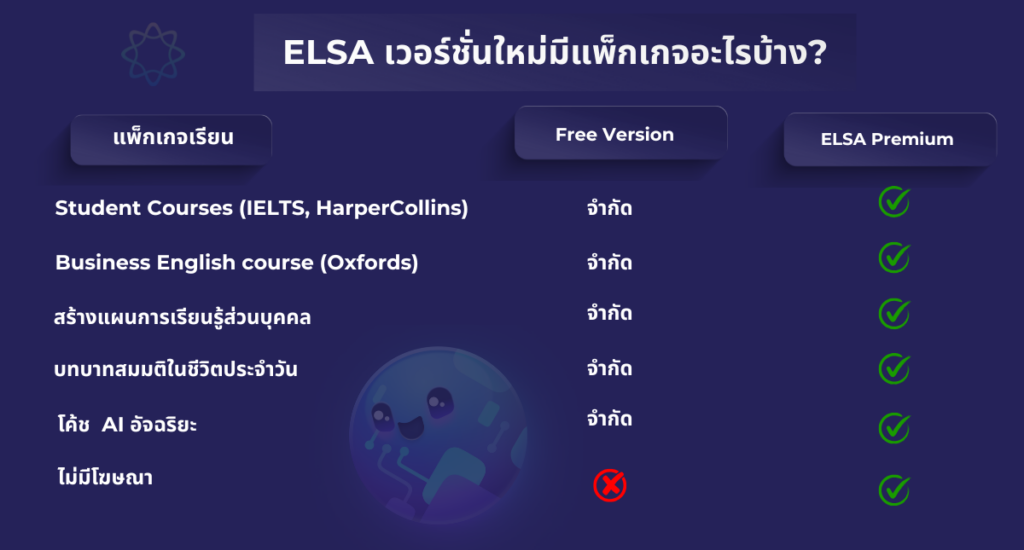
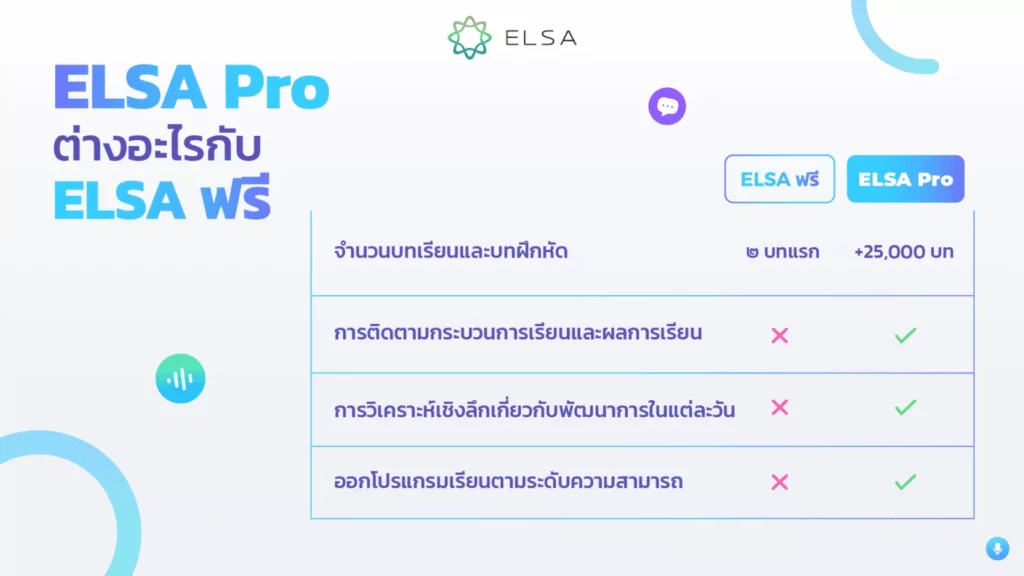
สำนวนเกี่ยวกับสัตว์ภาษาอังกฤษ
นอกจากนี้ คำศัพท์เกี่ยวกับสัตว์ก็ยังถูกดัดแปลงเป็นสำนวนได้ดีมากอีกด้วย คุณสามารถดูและใช้สำนวนเหล่านี้เมื่อสื่อสารได้
- Badger someone: รบกวนใครบางคน
- An eager beaver: คนทำงานหนัก
- A busy bee: ยุ่งเหมือนผึ้ง, ยุ่งมาก
- Make a pig of oneself: กินมากเกินไป
- Make a beeline for something: มุ่งตรงไปที่บางสิ่ง
- Have a bee in one’s bonnet: มีความคิด, นึกในใจ, คิดเกี่ยวกับสิ่งนั้นบ่อยๆ เพราะมันค่อนข้างสำคัญ
- Take the bull by the horns: เผชิญกับสิ่งท้าทาย, เผชิญอันตราย
- A home bird: คนที่ชอบใช้เวลาว่างอยู่ที่บ้านมากกว่าออกไปข้างนอก
- The bee’s knees: ดีเลิศ ที่สุดของที่สุด
- Lead a cat and dog life: ดำรงชีวิตที่ทะเลาะ เบาะแว้งกันบ่อย
- An early bird: คนตื่นเช้า
- Alone bird/wolf: คนที่ชอบทำอะไรคนเดียว
- An odd bird/fish: คนมหึมา
- A rare bird: คนหรือสิ่งที่หายาก
- Let the cat out of the bag: (เผลอ)ปล่อยความลับ/(เผลอ)เปิดเผยความลับ
- A bird’s eye view: ภาพที่มองเห็นจากมุมสูง การสำรวจย่อๆ
- Bud someone: รบกวนใครบางคน
- Have butterflies in one’s stomach: ท้องไส้ปั่นป่วน (ตื่นเต้นมาก)
- A cat nap: นอนงีบเล็กๆ
- Not have room to swing a cat: เนื้อที่น้อยเพียงนิดเดียว คับแคบมาก
คำคุณศัพท์อธิบายเกี่ยวกับสัตว์ภาษาอังกฤษ
เมื่อสื่อสาร คุณต้องเพิ่มคำคุณศัพท์ที่อธิบายสัตว์เพื่อทำให้การสนทนามีความหมาย โลกของสัตว์จะถูกอธิบายผ่านคำศัพท์พื้นฐานดังต่อไปนี้
- Cold-blooded /ˌkəʊld ˈblʌdɪd/: เลือดเย็น
- Domesticated /dəˈmestɪkeɪtɪd/: เลี้ยงในบ้าน
- Unique/Distinctive /juˈniːk/-/dɪˈstɪŋktɪv/: มีเอกลักษณ์/โดดเด่น
- Docile /ˈdəʊsaɪl/: ว่านอนสอนง่าย
- Omnivorous /ɒmˈnɪvərəs/: กินไม่เลือก
- Herbivorous /hɜːˈbɪvərəs/: กินหญ้า
- Carnivorous /kɑːˈnɪvərəs/: กินเนื้อ
- Loyal /ˈlɔɪəl/: ซื่อสัตย์
- Intelligent /ɪnˈtelɪdʒənt/: ฉลาด
- Wild /waɪld/: ป่า
- Poisonous /ˈpɔɪzənəs/: มีพิษ
- Ferocious /fəˈrəʊʃəs/: ดุร้าย
- Agile /ˈædʒaɪl/: ว่องไว
- Aggressive /əˈɡresɪv/: ก้าวร้าว
- Dangerous: /ˈdeɪndʒərəs/: อันตราย
- Tiny /ˈtaɪni/: จิ๋ว
- Energetic /ˌenəˈdʒetɪk/: กระฉับกระเฉง
- Scaly /ˈskeɪli/: สะเก็ด
- Fluff /ˈflʌfi/: ปุย
- Slimy /ˈslaɪmi/: ปลิ้นปล้อน
วิธีที่เร็วที่สุดในการจดจำคำศัพท์สัตว์ภาษาอังกฤษ
มีหลายสถานการณ์มากที่คุณต้องการชื่อสัตว์ภาษาอังกฤษนะ อย่างไรก็ตาม การจดจำคำศัพท์จำนวนมากนั้นก็ไม่ใช่เรื่องง่าย คุณต้องเรียนรู้วิธีการจดจำคำศัพท์เหล่านี้ ดังต่อไปนี้
เรียนรู้คำศัพท์สัตว์ภาษาอังกฤษด้วยเสียง
นี่เป็นวิธีที่สนุกมากในการเรียนรู้คำศัพท์ คุณสามารถตามหลักการ “การเชื่อมโยงชั่วคราว” เพื่อเรียนรู้ ในการใช้วิธีนี้ ในการใช้วิธีนี้ คุณต้องใช้คำภาษาอังกฤษที่เชื่อมโยงกับคำภาษาไทย การเชื่อมโยงนี้จะสร้างเรื่องราวระหว่างความหมายและการอ่านของคำ
นอกจากนี้ คุณยังสามารถเรียนรู้คำศัพท์เกี่ยวกับสัตว์จากเพลงได้อีกด้วย คุณสามารถฟังเพลงเกี่ยวกับสัตว์เพื่อจดจำพวกมันได้ ในการสอนคำศัพท์สัตว์ภาษาอังกฤษให้กับเด็กๆ หลายคนก็ใช้วิธีนี้ นี่เป็นวิธีง่ายๆ แต่มีประสิทธิภาพมากเลยนะ
เรียนรู้คําศัพท์ภาษาอังกฤษพร้อมรูปภาพประกอบ
จากภาพสัตว์ คุณจะได้เรียนรู้คำศัพท์ที่เกี่ยวข้อง สามารถใช้แฟลชการ์ดหรือโมเดลสัตว์ของเล่นเพื่อสนับสนุนวิธีการเรียนรู้นี้ได้ การเรียนภาษาอังกฤษผ่านรูปภาพจะช่วยให้คุณจดจำคำศัพท์ได้ยาวนาน
เรียนรู้คำศัพท์สัตว์ภาษาอังกฤษตามกลุ่ม
ตอนแรก คุณควรเพิ่มคำศัพท์เกี่ยวกับสัตว์ที่คุ้นเคยก่อน จากนั้นขยายคำศัพท์สัตว์ภาษาอังกฤษที่เกี่ยวข้อง การแบ่งกลุ่มเพื่อศึกษาก็มีประสิทธิภาพมากเช่นกัน คุณสามารถเรียนรู้และเชื่อมโยงสัตว์ได้ในเวลาเดียวกัน และจัดหมวดหมู่กลุ่มของพวกมันได้อีกด้วย
ตัวอย่างเช่น การเรียนรู้คำศัพท์เกี่ยวกับสิงโต (lion) คุณก็ควรเรียนรู้คำศัพท์เพิ่มเติมเกี่ยวกับสัตว์ป่าด้วย การจำสัตว์ในกลุ่มเดียวกันจะช่วยให้คุณเรียนรู้ได้เร็วขึ้น
เริ่มจากการฟังก่อน
การเรียนรู้คำศัพท์สัตว์ภาษาอังกฤษและการท่องจำในเวลานานเป็นกระบวนการ เพื่อที่จะจำคำศัพท์ได้นาน จงฟังก่อน แล้วจึงพูด อ่าน และเขียนคำศัพท์นั้น ดังนั้นคุณจะจำคำศัพท์ได้ ออกเสียงได้ถูกต้อง และใช้ได้อย่างมีประสิทธิภาพอีกด้วย
คำศัพท์สัตว์ภาษาอังกฤษมีเยอะมาก ถ้าคุณอยากจดจำทั้งหมด ก็ไม่ใช่แค่อ่านเพียงไม่กี่ครั้งนะ ควรค้นหาคำบ่อยๆ พูดถึงคำเหล่านั้น เพื่อจะจำได้นานและจำได้ลึกซึ้ง ทำให้การสนทนาของคุณน่าสนใจยิ่งขึ้นและมีส่วนร่วมด้วยคำศัพท์มากมาย!
Linking verb คือ กริยาหรือไม่ คำเหล่านี้ทำหน้าที่อะไรเมื่อเทียบกับกริยา และเมื่ออยู่ในบริบทแล้วจำเป็นต้องให้ผู้พูดผันกริยาหรือไม่ อันที่จริง linking verb ล้วนเป็นคำที่คุ้นเคยในภาษาอังกฤษซึ่งคุณต้องเคยพบเจอมาก่อน ในบทความนี้ ELSA Speak จะให้ผู้เรียนความรู้เกี่ยวกับ Linking verb มีอะไรบ้าง
Linking verb คืออะไร?
คำนิยาม
Linking verbs หรือที่เรียกว่า คำกริยาเชื่อม ที่ทำหน้าที่เชื่อมต่อหัวเรื่องและภาคแสดง คำกริยาเชื่อมไม่เหมือนกับคำกริยาตรงที่ไม่ได้แสดงการกระทำ แต่บ่งบอกถึงสถานะของสิ่งของ เหตุการณ์ และผู้คน
หมายเหตุบางประการเกี่ยวกับลักษณะและการใช้ linking verb เช่น
- อธิบายสถานะและลักษณะของเหตุการณ์/สิ่งของ
- ตามด้วยคำคุณศัพท์และคำนาม/นามวลีที่มี linking verbs
- ไม่สามารถผันใน continuous tense ใด ๆ ได้
เพื่อเข้าใจ linking verb คือ อะไรเพิ่มเติม ดูตัวอย่างต่อไปนี้:
- She seemed unable to concentrate.
- They are so clever.
- The house became Peter’s in 1980.
คุณควรดูความรู้เพิ่มเติมเกี่ยวกับคำกริยาเพื่อให้เข้าใจได้ดีขึ้น:
รูปแบบของ Linking verb
รูปแบบ to be
กริยา “to be” (am, is, are, was, were, been, being) เป็นกริยาเชื่อมที่ใช้กันมากที่สุดชนิดหนึ่ง หน้าที่ของกริยานี้คือการเชื่อมประธานกับส่วนประกอบเพื่ออธิบายสถานะ ลักษณะ หรือลักษณะของประธาน
โครงสร้างทั่วไป:
- Adj (คูาคุณศัพท์): บรรยายลักษณะและสถานะของประธาน
- Noun (คํานาม): กำหนดบทบาทหรือตัวตนของประธาน
ตัวอย่าง:
- She is beautiful. (เธอสวย)
- He is a doctor. (เขาเป็นหมอ)
อย่างไรก็ตาม ควรสังเกตว่าในหลายกรณี “to be” จะไม่ทำหน้าที่เป็นกริยาเชื่อมอีกต่อไป แต่จะปรากฏเป็นกริยาช่วย
ตัวอย่าง:
- She is listening to music. (เธอกําลังฟังเพลง)
- Peter was asked to join the Math class this evening. (ปีเตอร์ได้รับการขอให้เข้าร่วมชั้นเรียนคณิตศาสตร์เย็นนี้)
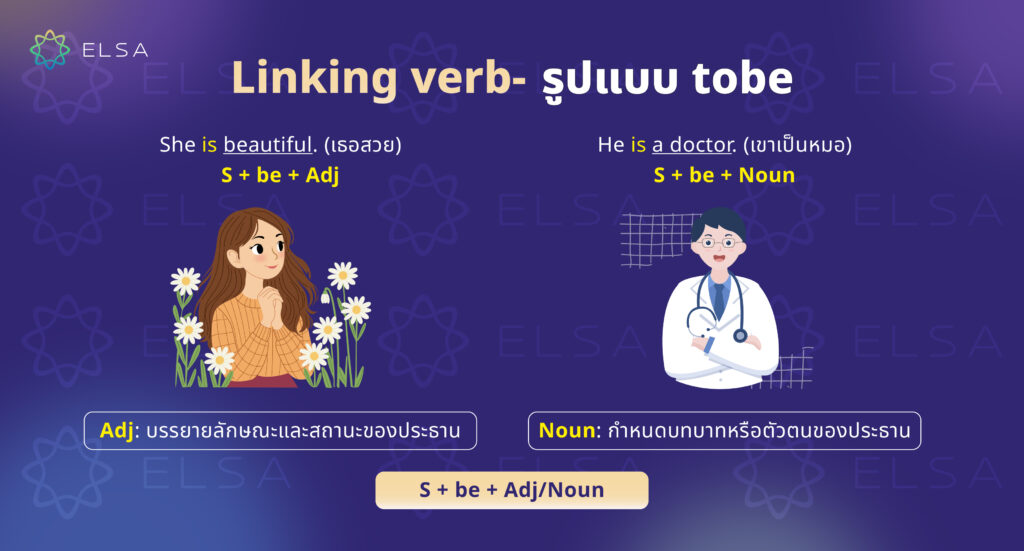
รูปแบบกริยาที่เกี่ยวข้องกับการรับรู้/ความรู้สึก
| Linking verb | ความหมาย | ตัวอย่าง |
|---|---|---|
| seem | ดู ดูเหมือน | She seems tired. (เธอดูเหนื่อย) |
| appear | ดู | He appears confident. (เขาดูมั่นใจ) |
| look | ดู | They look happy. (พวกเขาดูมีความสุขดี) |
กริยาที่เกี่ยวข้องกับการเปลี่ยนแปลง
| Linking verb | ความหมาย | ตัวอย่าง |
|---|---|---|
| become | ได้เป็น | She became a doctor. (เธอได้เป็นหมอ) |
| grow | กลายเป็น พัฒนาไปเป็น | He grew stronger after practice. (เขาแข็งแกร่งขึ้นหลังจากฝึกซ้อม) |
| get | เริ่ม เป็น (มักใช้ในภาษาพูด) | It’s getting dark. (มันเริ่มมืดแล้ว) |
| turn | กลายเป็น เริ่มเป็น | Her face turned red. (หน้าของเธอแดงก่ำ) |
กริยาแสดงการรับรู้ การรับรู้ทางประสาทสัมผัส
| Linking verb | ความหมาย | ตัวอย่าง |
|---|---|---|
| feel | รู้สึก | I feel happy today. (วันนี้ฉันรู้สึกมีความสุข) |
| smell | ได้กลิ่น มีกลิ่น | The soup smells delicious. (ซุปหอมอร่อย) |
| sound | ฟังดู | That idea sounds interesting. (ไอเดียนั้นฟังดูน่าสนใจนะ) |
| taste | มีรส | The cake tastes sweet. (เค้กมีรสหวาน) |
โครงส้รางประโยค linking verb
โครงสร้างทั่วไป
| S + linking verb + to be + V-ing |
ตัวอย่าง:
- She seems to be crying. (เธอดูเหมือนจะร้องไห้)
- He appears to be working hard. (เขาดูเหมือนจะทำงานหนัก)
- They proved to be cheating. (พวกเขาพิสูจน์แล้วว่าพวกเขาโกง)
โครงสร้างกับ appear/look/prove/seem/turn out
| S + appear/look/prove/seem/turn out + (to be) + Adj/Noun |
ตัวอย่าง:
- She looks (to be) happy. (เธอดูมีความสุข)
- The plan turned out (to be) a success. (แผนนี้ประสบความสำเร็จ)
- He seemed (to be) a good leader. (เขาดูเป็นผู้นำที่ดี)
โครงสร้างกับ alive/along/asleep/awake
| S + linking verb + to be + alive/along/asleep/awake |
ตัวอย่าง:
- The patient was still alive. (คนไข้ยังมีชีวิตอยู่)
- The baby is asleep. (ทารกหลับอยู่)
- He is awake now. (ตอนนี้เขาตื่นแล้ว)
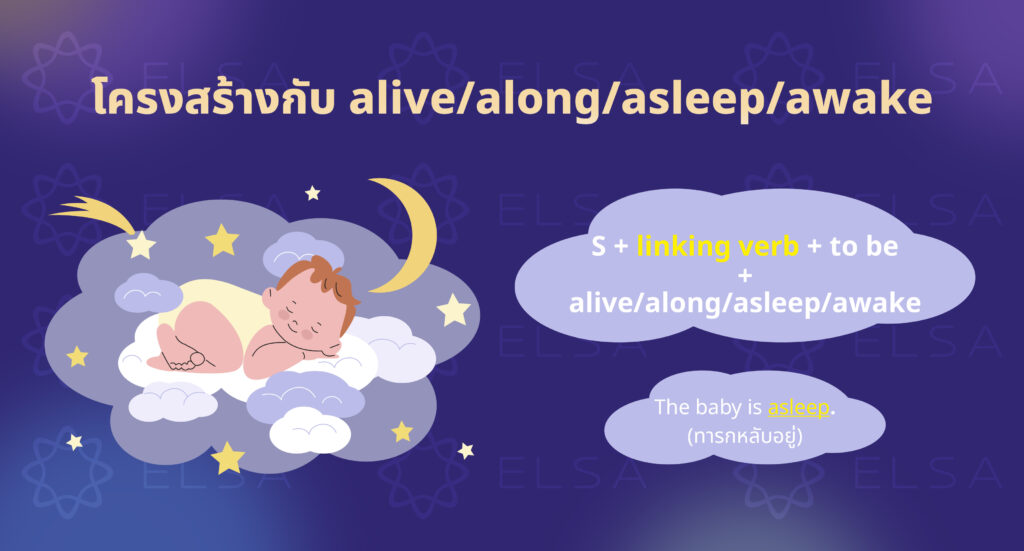
โครงสร้างกับ be/become/remain
| S + be/become/remain + Noun phrase |
ตัวอย่าง:
- She is a teacher. (เธอเป็นครู)
- He became a doctor. (เขาได้เป็นหมอ)
- They remain good friends. (พวกเขายังคงเป็นเพื่อนที่ดีต่อกัน)
โครงสร้างเมื่อกลายเป็นสกรรมกริยา
ประโยคบอกเล่า:
| ประธาน + Linking verb + กรรม |
ตัวอย่าง:
- She tasted the soup. (เธอชิมซุป)
- He smelled the flowers. (เขาได้กลิ่นดอกไม้)
- They felt the cold wind. (พวกเขารู้สึกถึงลมหนาว)
ประโยคที่ใช้กาลต่อเนื่อง
| ประธาน + กริยา to be (am/is/are) + Linking verb + กรรม |
ตัวอย่าง:
- She is tasting the cake. (เธอกำลังชิมเค้ก)
- He is smelling the perfume. (เขากำลังดมน้ำหอม)
- They are feeling the fabric. (พวกเขากำลังสัมผัสเนื้อผ้า)
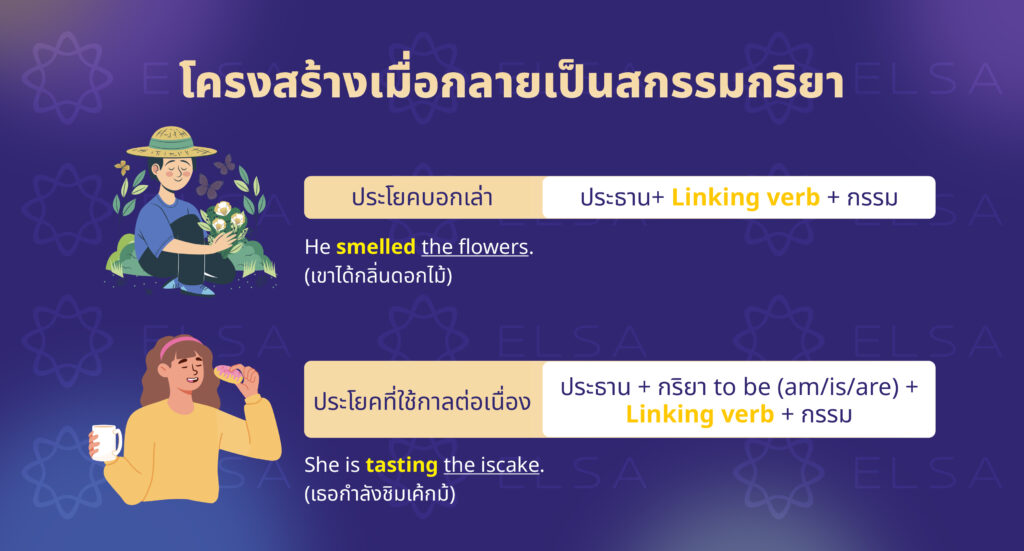
ความผิดพลาดที่พบบ่อยเมื่อใช้ linking verb
ความสับสนระหว่าง action verb กับ linking verb
ในภาษาอังกฤษมีคำกริยาพิเศษบางคำ เช่น look, sound, taste, smell, feel ซึ่งคำกริยาเหล่านี้สามารถใช้เป็น linking verb (คำกริยาเชื่อม) หรือ action verb (คำกริยาแสดงการกระทำ) ได้ ขึ้นอยู่กับบริบท นี่เป็นเหตุผลที่ผู้เรียนหลายคนสับสน นำไปสู่การแปลที่ไม่ถูกต้องหรือประโยคที่ไม่ถูกต้อง
ตัวอย่าง:
- Action verb: He looked at me carefully. (เขาจ้องมองฉันอย่างระมัดระวัง)
→ ที่นี่ “looked at” แสดงการกระทำ “มอง” - Linking verb: He looked tired. (เขาดูเหนื่อย)
→ ในกรณีนี้ “looked” ทำหน้าที่เป็น linking verb ตามด้วยคำคุณศัพท์ “tired” เพื่ออธิบายสถานะของประธาน
ใช้ Linking verb เป็นกาลปัจจุบันต่อเนื่อง
หลายคนคิดว่า ล้วนเป็น Verbs (คำกริยา) แน่นอนว่า Linking verbs ทั้งหมดจะผันใน continuous tense ได้ อย่างไรก็ตาม ความจริงไม่ได้เป็นเช่นนั้น
ลองดูตัวอย่างต่อไปนี้
It seems normal in the USA when somebody is naked on the beach. (Correct)
It is seeming normal in the USA when somebody is naked on the beach. (Incorrect)
→ เหตุพลทําไมผิด: กริยา seem อยู่ในกลุ่ม stative verbs (กริยาแสดงสถานะ ความรู้สึก การรับรู้) โดยปกติไม่ใช้ในรูปแบบต่อเนื่อง (is seeming, are seeming, was seeming, …).
It sounds tedious. (Correct)
It is sounding tedious (Incorrect)
→ เหตุพลทําไมผิด: กริยาเหล่านี้ไม่ได้ใช้ในกาลต่อเนื่อง (is sounding, are sounding, was sounding…), เพราะมันไม่ใช่การดำเนินการต่อเนื่องแต่เป็นสถานะการประเมินผล
โปรดจำไว้ว่า Linking verbs ส่วนใหญ่ไม่สามารถผันใน continuous tense มีเพียงคำบางคำ เช่น feel, look, smell และ taste เท่านั้นที่ผันคำใน continuous tense ได้ อย่างไรก็ตาม ในกรณีเหล่านั้น คำเหล่านี้จะไม่ทำหน้าที่เชื่อมโยงและไม่ใช่ Linking verbs อีกต่อไป แต่กลายเป็น Action verbs (คำกริยาการกระทำ)
ตัวอย่าง:
- They are looking so nervous about the test results.
- Lanna is tasting the soup.
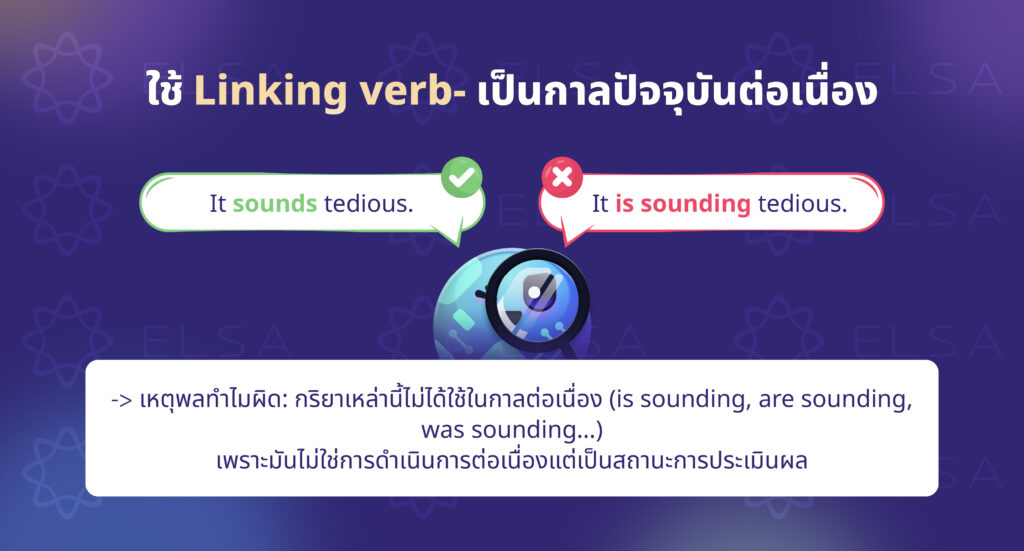
ใช้คำวิเศษณ์แทนส่วนขยายคำคุณศัพท์
โดยปกติแล้ว linking verb มักจะใช้ร่วมกับคำคุณศัพท์ (adjective) เพื่ออธิบายสถานะหรือลักษณะของประธาน อย่างไรก็ตาม ในบางกรณีพิเศษ คำวิเศษณ์ (adverb) ก็สามารถใช้เพื่อเพิ่มความหมายได้ โดยเฉพาะอย่างยิ่งเมื่อต้องการเน้นลักษณะหรือระดับ
สูตร:
| S + linking verb + Adverb |
ตัวอย่าง:
- The meeting is over. (การประชุมจบแล้ว)
- He is here. (เขาอยู่ที่นี่)
- She is there. (เธออยู่ที่นั่น)
รวมกับคำกริยาแสดงการกระทำ
ในหลายกรณี linking verb สามารถปรากฏร่วมกับกริยาแสดงการกระทำ (action verb) เพื่อสร้างประโยคที่เป็นธรรมชาติและมีความหมายมากขึ้น การผสมผสานนี้ช่วยแสดงสถานะของประธานและอธิบายการกระทำที่ประธานกระทำ
สูตร:
| S + linking verb + Adj/Noun + and + Action verb |
ตัวอย่าง:
- She seems happy and smiles a lot. (เธอดูมีความสุขและยิ้มแย้มมาก)
- He became a teacher and teaches English at school. (เขามาเป็นครูและสอนภาษาอังกฤษที่โรงเรียน)
- They looked tired but still continued working. (พวกเขาดูเหนื่อยแต่ก็ยังทำงานต่อไป)
ขาดส่วนประกอบอยู่หลัง linking verb
หนึ่งในข้อผิดพลาดที่พบบ่อยในการใช้ linking verb คือการไม่เติมส่วนประกอบตามหลัง Linking verb จำเป็นต้องใช้ส่วนประกอบ (คำคุณศัพท์ คำนาม หรือคำวิเศษณ์บอกสถานะ/สถานที่) เสมอเพื่อเติมเต็มความหมาย หากปราศจากส่วนประกอบ ประโยคจะสั้นลงและสับสน
สูตรที่ถูกต้อง:
| S + linking verb + Complement (Adj/Noun/Adverb) |
ตัวอย่างที่ผิด: She looks.
-> ประโยคนี้ไม่สมบูรณ์ ไม่ชัดเจนว่าเธอ “ดู” เป็นอย่างไร
ตัวอย่างที่ถูกต้อง:
- She looks beautiful. (เธอสวยมาก)
- The room is clean. (ห้องสะอาด)
- He became a doctor. (เขาได้เป็นหมอ)
หมายเหตุ: ควรจำไว้เสมอว่า linking verb ≠ คำกริยาแสดงการกระทำ ดังนั้นจำเป็นต้องมีส่วนประกอบเพื่อทำให้ประโยคมีความหมายสมบูรณ์
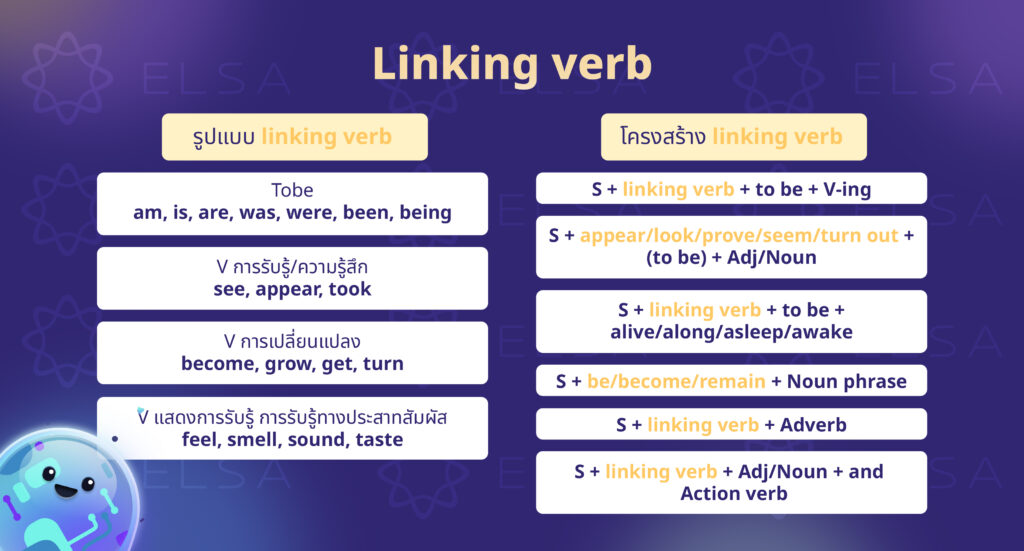
ความแตกต่างระหว่าง Linking verb กับ Action verb
นี่คือวิธีการแยกความแตกต่างระหว่าง action verb กับ linking verb:
| เกณฑ์ | Action verb (กริยาแสดงการกระทำ) | Linking verb (กริยาเชื่อม) |
|---|---|---|
| วิธีการใช้ | บรรยายการกระทำของประธาน | บรรยายถึงสถานะ ตำแหน่ง ลักษณะ หรือความรู้สึกของประธาน |
| สูตร | S + V + O | S + Linking verb + ส่วนประกอบ |
| ส่วนประกอบ | โดยปกติจะมีกรรม (Object) หรือไม่มีเลย | โดยปกติจะเป็นคําคุณศัพท์ คำนาม หรือวลีวิเศษณ์ |
| ตัวอย่าง | They eat lunch. (พวกเขาทานข้าวเที่ยง) | Their lunch is delicious. (มื้อเที่ยงของพวกเขาอร่อยมาก) |
ตารางแยกแยะความแตกต่างระหว่าง Action verb กับ Linking verb
แบบฝึกหัดเกี่ยวกับ Linking verb (พร้อมเฉลย)
แบบฝึกหัดที่ 1: ขีดเส้นใต้ Linking verbs ในประโยค
1. She is such a good student.
2. It tastes terrible.
3. Mr. James looks so handsome in this suit.
4. It turns bigger than expected.
5. These tasks seem to be difficult for us.
6. I feel grateful to have you as my friend.
7. It smells so bad.
8. She always proves to be a good girl.
9. I will become Miss. Universe one day.
10. The number of students remained unchanged within 2 years.
11. The landscape here is so stunning.
12. These jeans feel too tight for her.
13. She seemed tired after the party yesterday.
แบบฝึกหัดที่ 2: อ่านและดูว่าประโยคต่อไปนี้ถูกต้องตามหลักไวยากรณ์หรือไม่ถูกต้อง จากนั้นเติมคำว่า Correct (ถูกต้อง) และ Incorrect (ไม่ถูกต้อง) ใว้ข้างๆ
1. Mary seemed sad.
2. Mary seemed sadly.
3. The cake tastes good.
4. The cake tastes well.
5. The train is slowly.
6. The train is slow.
7. Remember to stay calmly.
8. Remember to stay calm.
9. Your project sounds interesting.
10. Your project sounds interestingly.
11. The negotiations appear to be better.
12. The negotiations appear be better.
13. The bride looks so gorgeous.
14. The bride looks so gorgeously.
แบบฝึกหัดที่ 3: ขีดเส้นใต้คำกริยาในประโยคต่อไปนี้ เขียน A หากเป็น Action verb (คำกริยาการกระทำ) หรือ L (หากเป็น Linking verbs)
1. The girl feels nervous.
2. Today is her wedding day.
3. She sits in a fancy chair.
4. Footmen carry the chair on their shoulders.
5. Her parents arranged the marriage.
6. She is only sixteen years old.
7. She sees her husband for the first time.
8. He looks handsome and kind.
9. She appears happy and content.
10. The family hopes for a happy marriage.
แบบฝึกหัดที่ 4: เติม Linking verbs ที่เหมาะสมลงในช่องว่างและผันคำกริยา
become sound feel look
appear grow seem getting
1. She…….. so beautiful in that white dress.
2. A. What about going to the Italian restaurant?
B. That ……..great!
3. She wants to ……….a fashion designer like Victoria Beckham in the future.
4. I ………..painful in my stomach after eating that cake.
5. It ……..interesting that he didn’t like anything except that bowl.
6. Teenagers like to make their own choice when they……… older.
7. Turn on the fan. It is …….. hotter and hotter.

แบบฝึกหัดที่ 5: เลือกคำตอบที่ถูกต้อง
1. July is smelling the soup her mother has just made.
A. action verb B. linking verb
2. My mother appeared exhausted after a hard day working on the paddy field.
A. action verb B. linking verb
3. Janes looks more beautiful when cutting her long hair.
A. action verb B. linking verb
4. Mary’s grandfather is looking for his wallet.
A. action verb B. linking verb
5. The weather is becoming hotter and hotter.
A. action verb B. linking verb
6. If you want to stay fit, you need to have a healthy diet.
A. action verb B. linking verb
7. My plan is to stay in Ha Long Bay in 2 weeks.
A. action verb B. linking verb
8. When you grow up, you need to choose a specific career.
A. action verb B. linking verb
9. I have been learning Japanese since 2017.
A. action verb B. linking verb
10. She appeared exhausted after the long working shift.
A. action verb B. linking verb
คำเฉลย
แบบฝึกหัดที่ 1:
ด้านล่างนี้เป็นตารางที่รวมเป็น 1 ตาราง มี 4 แถว โดยแต่ละแถวมีคำถาม 7 ข้อ:
| 1. is | 2. tastes | 3. looks | 4. turns | 5. seem | 6. feel | 7. smells |
| 8. proves | 9. become | 10. remained | 11. is | 12. feel | 13. seemed |
แบบฝึกหัดที่ 2:
| 1. Correct | 2. Incorrect | 3. Correct | 4. Incorrect | 5. Incorrect | 6. Correct |
| 7. Incorrect | 8. Correct | 9. Correct | 10. Incorrect | 11. Correct | 12. Incorrect |
แบบฝึกหัดที่ 3:
| 1 – feels – Linking verb | 6 – is – Linking verb |
| 2 – is – Linking verb | 7 – sees – Action verb |
| 3 – sits – Action verb | 8 – looks – Linking verb |
| 4 – carry – Action verb | 9 – appears – Linking verb |
| 5 – arranged – Action verb | 10 – hopes – Action verb |
แบบฝึกหัดที่ 4:
| looks | sounds | become | felt |
| sounded | grow | getting |
แบบฝึกหัดที่ 5:
| A | B | B | A | B |
| B | A | A | B | B |
จากตัวอย่างข้างต้น คุณจะเห็นได้ว่า Linking verb เป็นส่วนสำคัญในการสร้างประโยคบรรยายที่ชัดเจนและถูกต้องแม่นยำ การเข้าใจและการใช้คำกริยาเชื่อมอย่างถูกต้องจะช่วยให้คุณหลีกเลี่ยงข้อผิดพลาดทางไวยากรณ์พื้นฐานและพัฒนาทักษะการเขียนของคุณ อย่าลืมศึกษาความรู้ที่เป็นประโยชน์เพิ่มเติมบนเว็บไซต์ของ ELSA Speak กันนะ!
คุณอยากไปท่องเที่ยวที่ต่างประเทศ คุณจำเป็นต้องเรียนรู้ตัวอย่างประโยค ท่องเที่ยว ภาษาอังกฤษ อย่างด่วน ไม่ต้องกังวลนะ ELSA Speak ช่วยคุณได้ คุณสามารถนำตัวอย่างประโยคภาษาอังกฤษทั่วไป 40 ข้อด้านล่างนี้ไปใช้ในทุกสถานการณ์ได้ทันที นอกจากนี้ อย่าลืมลงทะเบียนคอร์สเรียนการสื่อสารภาษาอังกฤษของ ELSA Speak เพื่อให้พร้อมสำหรับ ท่องเที่ยว ภาษาอังกฤษ นะ
ตัวอย่างประโยคภาษาอังกฤษเกี่ยวกับการท่องเที่ยวแบบเร่งรัดที่ใช้ในเคาน์เตอร์จำหน่ายบัตรโดยสารในสนามบิน
ผู้เข้าชมจำเป็นต้องเรียนรู้รูปแบบประโยคภาษาอังกฤษอย่างด่วน ดังต่อไปนี้
| รูปแบบประโยค | ความหมาย |
| 1. I’d like to reserve two seats to… | ฉันต้องการจอง 2 ที่นั่งถึง… |
| 2. Will that be one way or round trip? | คุณต้องการตั๋วเที่ยวเดียวหรือไปกลับ |
| 3. How much is a round trip ticket? | ตั๋วไปกลับราคาเท่าไหร่ |
| 4. Will you pay by cash or by credit card? | คุณต้องการจ่ายเงินสดหรือบัตรเครดิต |
ตัวอย่างประโยคภาษาอังกฤษทั่วไปเกี่ยวกับการท่องเที่ยวใช้ที่เคาน์เตอร์เช็คอิน
ต่อไปนี้คือรูปแบบประโยคภาษาอังกฤษบางส่วนที่ใช้กันทั่วไปที่เคาน์เตอร์เช็คอินที่คุณต้องใส่ใจ
| รูปแบบประโยค | ความหมาย |
| 1. Can I see your ticket and passport, please? | ฉันขอดูตั๋วและหนังสือเดินทางของคุณได้ไหม |
| 2. Is anybody traveling with you today? | วันนี้มีใครไปกับคุณไหม |
| 3. How many luggage are you checking in? | คุณนำสัมภาระมากี่ชิ้น |
| 4. Would you like a window seat or an aisle seat? | คุณอยากจะนั่งใกล้หน้าต่างหรือริมทางเดินมากกว่ากัน |
| 5. We do not have any aisle seats remaining. Is a window seat ok with you or would you prefer a middle seat? | เราไม่มีที่นั่งริมทางเดินเหลืออยู่ คุณต้องการที่นั่งริมหน้าต่างหรือที่นั่งตรงกลาง |
| 6. Window seat please. | ขอที่นั่งริมหน้าต่างหน่อย |
หลังจากเสร็จสิ้นขั้นตอนการออกตั๋วขึ้นเครื่องแล้ว เจ้าหน้าที่ที่เคาน์เตอร์จะแจ้งหมายเลขประตูขึ้นเครื่องและเวลาออกเดินทางของเที่ยวบินให้คุณทราบ นี่คือบทสนทนาทั่วไปที่เจ้าหน้าที่จะบอกคุณ:
เจ้าหน้าที่: Here are your tickets. I am placing you two in 21A and 21B. The gate number is C2. It is on the bottom of the ticket. They will start boarding 20 minutes before the departure time. You should report to gate C2 by then. C2 is around the corner and down the hall. Thank you.
(นี่คือตั๋วของคุณ ที่นั่งของคุณคือ 21A และ 21B หมายเลขประตูคือ C2 สิ่งนี้ระบุไว้ในบรรทัดสุดท้ายบนตั๋ว ประตูเครื่องบินจะเริ่มเปิดก่อนเครื่องขึ้น 20 นาที คุณต้องไปถึงประตู C2 ก่อนเวลาดังกล่าว ขอบคุณ)
คุณ: How do I get to gate C2? Where do we go next?
(ฉันจะไปที่ประตู C2 ได้อย่างไร เราจะไปที่ไหนกันต่อ?)
เจ้าหน้าที่: Go to Gate C2, straight ahead then turn left
(โปรดไปที่ประตู C2 ตรงไปข้างหน้าแล้วเลี้ยวซ้าย)
ตัวอย่างประโยค ท่องเที่ยว ภาษาอังกฤษ ที่ใช้กันทั่วไปบนเครื่องบิน
| รูปแบบประโยค | ความหมาย |
| 1. What’s your seat number? | หมายเลขที่นั่งของคุณคืออะไร |
| 2. Could you please put that in the overhead locker? | กรุณาวางกระเป๋าไว้ในตู้เก็บของด้านบนหัว |
| 3. Please pay attention to this short safety demonstration | โปรดใส่ใจกับการสาธิตความปลอดภัยบนเครื่องบินสั้นๆ นี้ |
| 4. Please turn off all mobile phones and electronic devices | กรุณาปิดโทรศัพท์มือถือและอุปกรณ์อิเล็กทรอนิกส์อื่นๆ |
| 5. Please fasten your seat belt | กรุณารัดเข็มขัดนิรภัย |
| 6. How long does the flight take? | เที่ยวบินใช้เวลานานเท่าไหร่ |
| 7. Would you like any food or refreshments? | คุณต้องการอาหารจานหลักหรือเครื่องดื่มอะไรไหม |
| 8. May I have something to eat/drink? | ฉันขออะไรกิน/ดื่มหน่อยได้ไหม |
| 9. I’d like to drink Coke with no ice | ฉันอยากดื่มโค้กโดยไม่ใส่น้ำแข็ง |
| 10 .We’ll be landing in about fifteen minutes | เราจะลงจอดในอีกประมาณสิบห้านาที |
| 11. Please fasten your seatbelt and return your seat to the upright position | โปรดคาดเข็มขัดนิรภัยและปรับที่นั่งให้อยู่ในตำแหน่งตั้งตรง |
| 12. Please stay in your seat until the aircraft has come to a complete standstill and the Fasten Seatbelt sign has been switched off | โปรดอยู่ในที่นั่งของคุณจนกว่าเครื่องบินจะหยุดนิ่งสนิทและสัญญาณคาดเข็มขัดนิรภัยดับลง |
| 13. The local time is … | เวลาท้องถิ่นปัจจุบันคือ… |
| หากคุณชอบเดินทางและอยากสื่อสารได้ง่ายระหว่างทริป ลองเรียนรู้วิธีถามปริมาณหรือจำนวนด้วย how much how many ที่ใช้งานได้จริงในทุกสถานการณ์ จะช่วยให้คุณถามราคา สั่งอาหาร หรือสอบถามจำนวนสิ่งของได้คล่องและมั่นใจมากขึ้น |
ตัวอย่างประโยคภาษาอังกฤษเกี่ยวกับการท่องเที่ยวอย่างด่วนที่ใช้ในศุลกากร
เจ้าหน้าที่ศุลกากร: What is your nationality?
(คุณมีสัญชาติอะไร?)
คุณ: I’m Thai
(ฉันเป็นคนไทย)
เจ้าหน้าที่ศุลกากร: May I see your passport please?
(ฉันขอดูหนังสือเดินทางของคุณได้ไหม?)
คุณ: Here is my passport
(นี่คือหนังสือเดินทางของฉัน)
เจ้าหน้าที่ศุลกากร: Are you here on business or leisure? What is the reason for your visit?
(คุณมาที่นี่เพื่อทำธุรกิจหรือท่องเที่ยว?เหตุผลที่คุณมาที่นี่คืออะไร?)
คุณ: I have a connecting flight . Because I want to rest with my family / I am traveling for work / I am visiting family. I will be here for_____days. I am staying at _____
(มีเที่ยวบินต่อเครื่อง เพราะฉันอยากไปเที่ยวกับครอบครัว/ฉันเดินทางไปทำงาน/ฉันไปเยี่ยมครอบครัวฉันจะอยู่ที่นี่เป็นเวลา _____ วัน ฉันจะอยู่ที่ _____)

ตัวอย่างประโยค ท่องเที่ยว ภาษาอังกฤษ ที่ใช้ในโรงแรม
Making a reservation: ทำการจองห้อง
| 1. May I reserve a room? | ฉันสามารถจองห้องพักล่วงหน้าได้หรือไม่ |
| 2. Hi, how much are your rooms? | สวัสดี ขอถามหน่อยว่าห้องของคุณราคาเท่าไหร่ |
| 3. I will only need one room. | ฉันต้องการเพียงห้องเดียวเท่านั้น |
| 4. I am going to stay for 3 days. | ฉันจะอยู่เป็นเวลา 3 วัน |
| 5. I want a room from June 22nd to June 25th. | ฉันต้องการห้องตั้งแต่ 22 มิ.ย. ถึง 25 มิ.ย. |
| 6. We only have a room with two double size beds. Will that be ok? | เรามีห้องที่มีเตียงคู่ 2 เตียงเท่านั้น จะโอเคไหม? |
| 7. I will be alone. | ฉันจะอยู่คนเดียว |
| 8. I will only need one room. | ฉันต้องการเพียงห้องเดียวเท่านั้น |
| 9. I would like to reserve the room for 4 days. | ฉันต้องการจองห้องพัก 4 วัน |
| 10. Hello, can I reserve a couple of rooms? | สวัสดี ฉันสามารถจองห้องพักล่วงหน้าได้หรือไม่ |
Checking in: การลงทะเบียนห้องพัก
| 11. Hi, I am checking in. | สวัสดี ฉันมาที่นี่เพื่อเช็คอิน |
| 12. Hi, I have a reservation and I am checking in. | สวัสดี ฉันได้ทำการจองแล้ว และตอนนี้ฉันต้องการเช็คอิน |
| 13. Can I see your photo ID? | ฉันขอดูบัตรประจำตัวของคุณได้ไหม |
| 14. This is your room’s key. The room 401. | นี่คือกุญแจห้องของคุณ ห้อง 401 |
Checking out: เช็คเอาท์
| 15. I’m checking out today. May I settle my bill? | วันนี้ฉันจะเช็คเอาท์ ฉันขอชำระบิลของฉันได้ไหม |
| 16. May I have a look at the breakdown? | ฉันขอดูรายละเอียดได้ไหม |
| 17. May I pay by credit card? | ฉันสามารถชำระเงินด้วยบัตรเครดิตได้หรือไม่ |
| 18. There was a mistake in your bill. | มีข้อผิดพลาดในบิลของคุณ |
ตัวอย่างประโยคทั่วไปอื่น ๆ ที่โรงแรม
| 19. Do you have a bellman/ concierge here? | คุณมีพนักงานยกกระเป๋า/เจ้าหน้าที่ดูแลแขกที่นี่หรือไม่ |
| 20. May you get someone to get my car | ช่วยเรียกคนมารับรถของฉันหน่อยได้ไหม |
ตัวอย่างประโยคภาษาอังกฤษเกี่ยวกับการท่องเที่ยวอย่างด่วนเมื่อช้อปปิ้งในต่างประเทศ
เมื่อท่องเที่ยวไปต่างประเทศ คุณจะต้องซื้อของใช้และของที่ระลึกสำหรับสมาชิกในครอบครัวอย่างแน่นอน ดังนั้นคุณต้องรู้รูปแบบประโยคภาษาอังกฤษเมื่อซื้อของ ดังนี้
| รูปแบบประโยค | ความหมาย |
| How much is this? How much does this cost? | อันนี้ราคาเท่าไหร่? |
| Have you got anything cheaper? | คุณมีอะไรถูกกว่านี้ไหม? |
| Do you have this item in stock? | คุณยังมีรายการนี้หรือไม่? |
| Do you know anywhere else I could try? | คุณรู้หรือไม่ว่ามีที่อื่นขายหรือไม่? |
ตัวอย่างประโยคภาษาอังกฤษเกี่ยวกับการท่องเที่ยวอย่างด่วนที่ใช้เพื่อสื่อสารทั่วไปในการเดินทาง
| 1. Can you speak English? | คุณพูดภาษาอังกฤษได้ไหม |
| 2. My name is …. | ฉันชื่อ |
| 3. I’m glad to meet you | ฉันดีใจที่ได้พบคุณ |
| 4. Where do you come from? | คุณมาจากที่ไหน |
| 5. How long are you going to stay there? | คุณจะอยู่ที่นั่นนานแค่ไหน |
| 6. Could you show me the way to ……..,please? | ช่วยบอกทางไป…….หน่อยได้ไหม |
| 7. Where is the restroom? | ห้องน้ำอยู่ที่ไหน |
| 8. Could you please take me to….? | คุณช่วยพาฉันไปที่….ได้ไหม |
| 9. Where can I find a bus? | ฉันจะหารถบัสได้ที่ไหน |
| 10. I need your help. | ฉันต้องการความช่วยเหลือจากคุณ |
| 11. How much does this cost? | อันนี้ราคาเท่าไหร่ |
| 12. Sorry, can you repeat what you just said? | ขอโทษ คุณช่วยพูดซ้ำสิ่งที่คุณเพิ่งพูดไปได้ไหม |
| 13. I’ll take that. | ฉันจะเอาอันนี้ |
| 14. Where can I get something to eat? | ฉันจะหาของกินได้ที่ไหน |
| 15. Will you write that down for me? | คุณช่วยเขียนสิ่งนั้นให้ฉันได้ไหม |
| 16. Please call the Thai Embassy. | กรุณาโทรติดต่อสถานเอกอัครราชทูตไทย |
| 17. Could you speak more slowly? | คุณพูดช้าลงหน่อยได้ไหม |
| 18. Could you show me the way to the station, please? | คุณช่วยบอกทางไปสถานีให้ฉันหน่อยได้ไหม |
| 19. Do you take credit cards? | คุณรับเครดิตการ์ดหรือไม่ |
| 20. Could you show me on a map how to get there? | คุณช่วยแสดงวิธีการเดินทางบนแผนที่ให้ฉันหน่อยได้ไหม |
| 21. I’m lost. | ฉันหลงทา |
| 22. I don’t understand | ฉันไม่เข้าใจ |
| 23. I don’t speak English very well | ภาษาอังกฤษของฉันไม่ดีมาก |
| 24. Please speak slowly | กรุณาพูดช้าๆ |
นอกจากการเรียนรู้รูปแบบประโยคทั่วไปแล้ว คุณยังสามารถเรียนรู้เพิ่มเติมเกี่ยวกับาคำศัพท์และโครงสร้างภาษาอังกฤษในขณะท่องเที่ยวด้วยวิธีอื่นๆ อีกมากมาย การเข้าร่วมคอร์สเรียนภาษาต่างประเทศระยะสั้นที่ศูนย์ยังเป็นทางเลือกที่หลายคนไว้วางใจ
Phrasal verbs (กริยาวลี) จะช่วยให้คุณมั่นใจและสบายใจมากขึ้นเมื่อใช้ภาษาอังกฤษ ไม่มีความรู้สึกแข็งกระด้างในการแสดงออกอีกต่อไป นี่เป็นผู้ช่วยที่ดีหากคุณต้องการสื่อสารอย่างคล่องแคล่วเหมือนเจ้าของภาษา
ดังนั้น ELSA Speak จะแบ่งปันทุกสิ่งที่คุณจำเป็นต้องรู้เกี่ยวกับ phrasal verbs และรายการมี 200 phrasal verbs ที่พบบ่อยที่สุด
Phrasal verb (กริยาวลี) คืออะไร?
Phrasal verb คือการรวมกันของกริยา 1 คำและ1 หรือ 2 อนุภาค (particles) โดยอนุภาคเหล่านี้สามารถเป็นคำบุพบท (particles) หรือคำวิเศษณ์ (adverb) อย่างไรก็ตาม เมื่อมีการเพิ่มอนุภาคเหล่านี้เข้าไป ความหมายของ phrasal verb จะแตกต่างอย่างสิ้นเชิงจากคำกริยาที่ประกอบขึ้น
มาดู phrasal verb ตัวอย่างประโยค:
Pick: เลือก
“We need to pick which meal we’d like to eat”
แต่เมื่อเราเติม up หลัง pick จะเกิดอะไรขึ้น?
Phrasal verb: Pick up
ความหมายของ pick up มีการเปลี่ยนแปลงและขึ้นอยู่กับบริบทซึ่งจะมีความหมายแตกต่างกัน เช่น
- ปรับปรุง ดีขึ้น: The weather is picking up lately, isn’t it?
ช่วงนี้อากาศเริ่มดีขึ้นแล้วใช่ไหม?
- ไปรับใคร: Can you pick up Jenny after football practice?
คุณไปรับเจนนี่หลังซ้อมฟุตบอลได้ไหม
- รับบางสิ่ง: Can you pick up my parcel from the post office?
คุณสามารถรับพัสดุของฉันจากที่ทำการไปรษณีย์ได้หรือไม่?
- ได้รับความรู้: James picked up Spanish really quickly.
เจมส์พูดภาษาสเปนได้เร็วมาก
ว้าว แค่เติม “up” ตามหลัง ก็สร้างความแตกต่างได้มากแล้ว
จดโน้ต: Phrasal verb = verb + particles (คำบุพบท หรือคำวิเศษณ์)


ลักษณะและหลักการใช้ phrasal verb
Transitive หรือ Intransitive
การทำความเข้าใจความแตกต่างระหว่างสกรรมกริยา (transitive verbs) และอกรรมกริยา (intransitive verbs) จะช่วยคุณได้มาก
อย่างไรก็ตาม ในบทความนี้ เราไม่ได้พูดถึงการวิเคราะห์ไวยากรณ์ แต่เพียงเข้าใจว่า เพื่อให้ประโยคมีความหมาย ก็ต้อง:
สกรรมกริยา (transitive verbs) = ต้องการบางสิ่งหรือบางคนหลังคำกริยา
อกรรมกริยา (intransitive verbs) = ยืนอยู่คนเดียว
ตัวอย่างเช่น phrasal verb “bump into” มีความหมายว่า บังเอิญเจอใครบางคน และจำเป็นต้องมี “บางคน” ตามกริยาวลีนี้
คุณไม่สามารถพูดว่า
“Yesterday, I bumped into. Haven’t seen her in years!”
แทนที่นั้น คุณควรพูดว่า
“Yesterday, I bumped into Sarah. Haven’t seen her in years!”
ข้อยกเว้น: ในคำพูด เราไม่อยากเปิดเผยว่า เราบังเอิญเจอใคร
“I went to town yesterday. You’ll never guess who I bumped into.”
ฉันไปเมืองเมื่อวานนี้ คุณจะไม่เดาได้ว่าฉันเจอใคร
ถึงกระนั้นก็ตาม “who” คือบางคน ที่เราต้องมีในประโยค เพื่อทำให้ประโยคมีความหมาย
ในทางกลับกัน phrasal verb บางคำเป็นอกรรมกริยา หมายความว่าสามารถยืนอยู่คนเดียวในประโยคได้
ตัวอย่าง:
Grow up: เติบโต โตขึ้น
- They grew up in England.
พวกเขาเติบโตในอังกฤษ
- Your daughter is growing up so fast!
ลูกสาวของคุณโตเร็วมาก!
- When I grow up, I want to be a popstar.
เมื่อฉันโตขึ้น ฉันอยากเป็นป๊อปสตาร์
หมายเหตุ: มี phrasal verb ที่ทั้งเป็นสกรรมกริยาและอกรรมกริยา
Wake up: ตื่น
- I wake up (ฉันตื่น)
- I wake up Sarah (ฉันปลุกซาร่าห์ให้ตื่น)
กริยาวลีที่แยกกันได้ (Separable) และ กริยาวลีที่แยกกันไม่ออก (Inseparable)
เช่นเดียวกับการแยก phrasal verb ออกเป็นสกรรมกริยาและอกรรมกริยา มาทำความคุ้นเคยกับคำนิยาม กริยาวลีที่แยกกันได้ และ กริยาวลีที่แยกกันไม่ออก
กลับไปที่ phrasal verb “wake up” เราอยากปลุกใครสักคนให้ตื่น (waking someone else up) จากนั้น phrasal verb “wake up” จะมาพร้อมกับสักคนหนึ่ง (someone else) ที่เราอยากปลุก
อย่างไรก็ตาม เราสามารถแยก wake up ออกได้ เพราะการใส่ someone else ระหว่าง wake และ up ก็ยังฟังดูดีอยู่ใช่ไหม ความหมายของประโยคจะไม่เปลี่ยนแปลง เจ้าของภาษายังคงใช้สำนวนนี้อยู่บ่อยครั้ง
เราจึงพูดได้ 2 แบบโดยไม่เปลี่ยนความหมาย คือ
- I wake up Sarah
- I wake Sarah up
ภาษาอังกฤษก็หลากหลายและน่าสนใจเหมือนภาษาไทยใช่ไหมล่ะ?
และสุดท้ายจะมีกริยาวลีที่แยกกันไม่ออก
Look up to someone: ชื่นชม เคารพใครบางคน
เราไม่สามารถพูดว่า “look someone up to” หรือ “look up someone to” แต่ควรพูดว่า
“I really look up to my father”
ฉันเคารพพ่อของฉันมาก
การทำความเข้าใจว่า phrasal verb เป็นสกรรมกริยา (transitive) หรืออกรรมกริยา (intransitive) และแยกกันได้ (separable) หรือแยกกันไม่ออก (inseparable) จะช่วยให้คุณใช้งานได้อย่างถูกต้องและก้าวหน้าอย่างรวดเร็ว
ข้อควรจำ: เมื่อเรียน phrasal verb ควรเรียนรู้เพิ่มเติมเกี่ยวกับ transitive – intransitive และ separable – inseparable
วิธีจำ phrasal verbs
ก่อนที่จะให้ phrasal verb ที่ใช้บ่อยที่สุดในการสื่อสารภาษาอังกฤษในชีวิตประจำวัน ELSA Speak จะแบ่งปันเคล็ดลับเพื่อให้คุณจดจำ phrasal verb ได้: เน้นไปที่หัวข้อ
จินตนาการว่า คุณกำลังสนุกกับการแข่งรถฟอร์มูล่าวัน จะมี phrasal จำนวนมากที่ใช้เกี่ยวข้องกับ “pull”:
“Hamilton pulled up at the pit stop, Vettel is pulling away slowly, Rosberg is pulling ahead”
คุณรู้สึกว่าคุณอยู่ในสนามแข่งหรือยัง? ตอนนี้ไปสนามบินกันเถอะ คุณอาจได้ยินหรือเห็นประกาศเกี่ยวกับสัมภาระของคุณ
“The plane takes off in 10 minutes, don’t forget to look after your luggage”
เที่ยวบินจะออกในอีก 10 นาที อย่าลืมตรวจสอบสัมภาระของคุณ
ฝึกฝน: เขียนหัวข้อหรือสถานการณ์ไว้กลางหน้า จากนั้นเพิ่ม phrasal verb ที่คุณรู้จัก (หรือค้นหา) ที่เกี่ยวข้องกับหัวข้อหรือสถานการณ์นั้น อย่าลืมสังเกตว่าแต่ละ phrasal verbs นั้นเป็นสกรรมกริยาหรืออกรรมกริยา แยกกันได้หรือแยกกันไม่ออก
จดโน้ต: เรียน phrasal verbs ตามหัวข้อและสถานการณ์
Phrasal verbs ที่พบบ่อยบางคำ
ด้านล่างนี้ ELSA Speak จะแนะนำ phrasal verbs ที่พบบ่อยตามแต่ละคำกริยา มาดูกันเลย!
- Phrasal verb “FALL”

- Phrasal verb “GET”
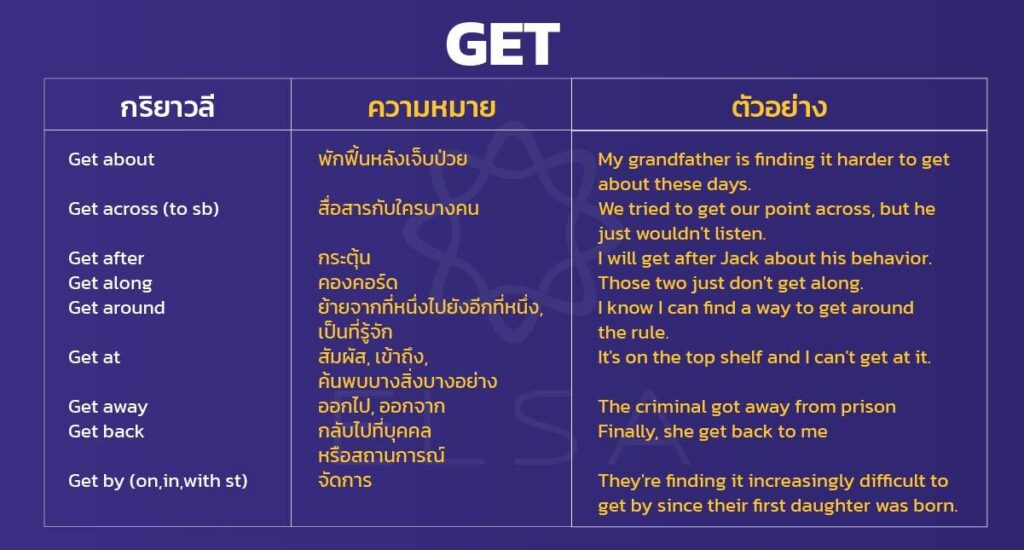
- Phrasal verb “GO”

- Phrasal verb “LOOK”

- Phrasal verb “TAKE”
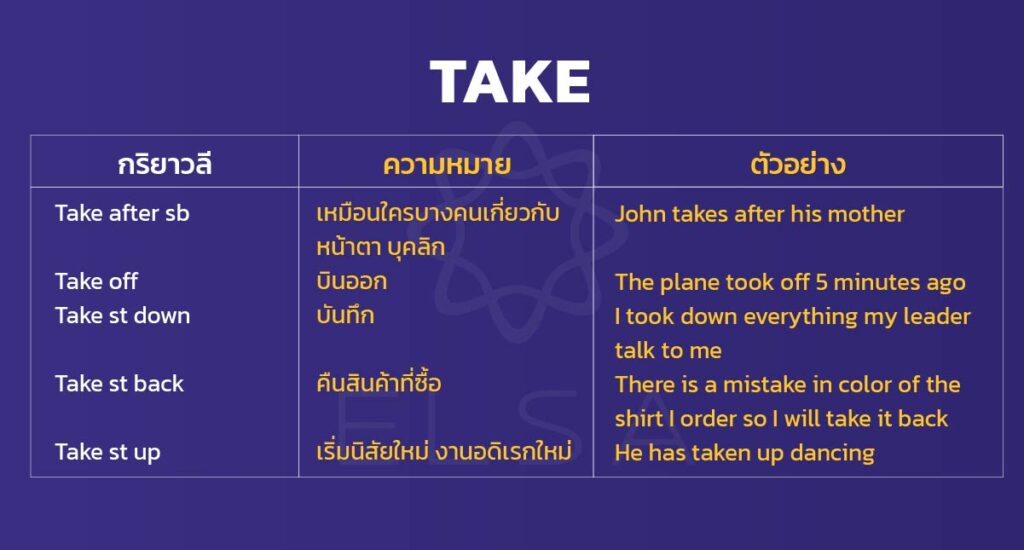
นอกจาก phrasal verb ทั่วไปที่กล่าวถึงข้างต้นแล้ว ยังมีกริยาวลีอื่นๆ อีกมากมายที่คุณอาจจะพบเจอในชีวิตประจำวัน ดังนั้น สร้างพจนานุกรมขนาดเล็กสำหรับตัวคุณเองเพื่อจดจำและนำไปใช้นะ!
Phrasal verbs ที่พบบ่อยที่สุด 200 คำ (รายการ Phrasal verbs ที่สมบูรณ์)
คุณอาจจะกำลังกระตือรือร้นและมุ่งมั่นที่จะเอาชนะ phrasal verbs ทั้งหมดใช่ไหมล่ะ?
อย่างไรก็ตาม ความเร่งรีบนี้จะทำให้คุณรู้สึกเบื่อและยอมแพ้อย่างรวดเร็ว เพราะความจริงแล้ว phrasal verb มีมากมาย แต่ที่ใช้บ่อยที่สุดและใช้กันทั่วไปมีเพียงไม่กี่คำเท่านั้น
เคล็ดลับ: จัดลำดับความสำคัญกับการเรียนรู้และเชี่ยวชาญ phrasal verbs ที่พบบ่อยที่สุด 200 คำ ด้านล่างนี้
>> 100 ประโยคภาษาอังกฤษที่ใช้สื่อสารในชีวิตประจำวัน: ดูที่นี่
Phrasal verbs ที่ขึ้นต้นด้วย A
1. Ask somebody out: เชิญใครสักคนออกเดต
He asked her out to dinner and a movie.
2. Ask around: ถามทุกคนในเรื่องเดียวกัน
I asked around but nobody has seen my wallet.
3. Add up to something: เทียบเท่า
Your purchases add up to $205.32.
Phrasal verbs ที่ขึ้นต้นด้วย B
4. Back something up: ย้อนกลับ
You’ll have to back up your car so that I can get out.
5. Back somebody up: สนับสนุน
My wife backed me up over my decision to quit my job.
6. Blow up: ระเบิด
The racing car blew up after it crashed into the fence.
7. Blow something up: เป่าลม
We have to blow 50 balloons up for the party.
8. Break down: พัง/เสีย (เครื่องจักร ยานพาหนะ)
Our car broke down at the side of the highway in the snowstorm.
9. Break down: เครียด/ใจเสีย
The woman broke down when the police told her that her son had died.
10. Break something down: แยกบางสิ่งออกเป็นส่วนย่อยๆ
Our teacher broke the final project down into three separate parts.
11. Break in: บุกเข้าไปในบ้าน
Somebody broke in last night and stole our stereo.
12. Break into something: บุกเข้าไป (มักใช้กำลังพังประตู/หน้าต่าง)
The firemen had to break into the room to rescue the children.
13. Break something in: การใส่อะไรหลายๆครั้งทำให้ไม่ใหม่เหมือนเคย
The new shoes is so tight that they hurt my feet. I need to break these shoes in before we run next week.
14. Break in: บุกรุก, ขัดจังหวะ
The TV station broke in to report the news of the celebrity’s death.
15. Break up: จบความสัมพันธ์ (เลิกคบใคร)
My boyfriend and I broke up before I moved to America.
16. Break up: หัวเราะออกมาดัง ๆ
The kids just broke up as soon as the clown started talking.
17. Break out: หนี
The prisoners broke out of jail when the guards weren’t looking.
18. Break out in something: เกิดอาการ…/เกิด… (บางอย่างขึ้น ใช้กับอาการทางผิวหนัง)
I broke out in a rash after eating shrimps.
19. Bring somebody down: ทำให้รู้สึกไม่มีความสุข/ทำให้ซึมเศร้า
This sad music is bringing me down.
20. Bring somebody up: เลี้ยงดู (บุตรหลาน)
My grandparents brought me up after my parents died.
21. Bring something up: พูดถึง, หยิบยกหัวข้อใดหัวข้อหนึ่งขึ้นมา
My mother walks out of the room when my father brings up sports.
22. Bring something up: อาเจียน
He drank so much that he brought his dinner up in the toilet.
Phrasal verbs ที่ขึ้นต้นด้วย C
23. Call around: โทรไปหลายที่ หลายคน
We called around but we weren’t able to find the car part we needed
24. Call somebody back: โทรกลับหาใคร
I called the company back but the offices were closed for the weekend.
25. Call something off: ยกเลิก
Jason called the wedding off because he wasn’t in love with his fiancé.
26. Call on somebody: ถามความคิดเห็นหรือคำตอบของใครบางคน
The professor called on me for question 1.
27. Call on somebody: ไปเยี่ยมใครสักคน
We called on you last night but you weren’t home.
28. Call somebody up: โทรหา
Give me your phone number and I will call you up when we are in town.
29. Calm down: ทำให้ใจเย็นลง
You are still mad. You need to calm down before you drive the car.
30. not care for somebody/something: ไม่ชอบใครบางคน/บางสิ่งบางอย่าง
I don’t care for his behaviour.
31. Catch up: ไปถึง/ไปทัน จุดที่คนอื่นอยู่
You’ll have to run faster than that if you want to catch up with Marty.
32. Check in: มายืนยันการจองโรงแรมหรือรับตั๋วที่สนามบิน
We will get the hotel keys when we check in.
33. Check out: ลงทะเบียนออกจากโรงแรม
You have to check out of the hotel before 11:00 AM.
34. Check somebody/ something out: กลั่นกรอง ตรวจสอบ
The company checks out all new employees.
35. Check out somebody/ something: ดู…สิ (ใช้แบบไม่เป็นทางการ)
Check out the crazy hair on that guy!
36. Cheer up: มีความสุขมากขึ้น
She cheered up when she heard the good news.
37. Cheer somebody up: ทำ…ให้ร่าเริง/ทำ…ให้มีความสุข
I brought you some flowers to cheer you up
38. Chip in: ช่วยเหลือ
If everyone chips in we can get the kitchen painted by noon.
39. Clean something up: ทำความสะอาด/จัดให้เรียบร้อย
Please clean up your bedroom before you go outside.
40. Come across something: พบโดยบังเอิญ
I came across these old photos when I was tidying the closet.
41. Come apart: แยกกัน
The top and bottom come apart if you pull hard enough.
42. Come down with something: ป่วย
My nephew came down with chicken pox this weekend.
43. Come forward: อาสาสมัครเพื่อปฏิบัติภารกิจหรือแสดงหลักฐาน
The woman came forward with her husband’s finger prints.
44. Come from some place: มาจากที่ไหนสักแห่ง
The art of origami comes from Asia.
45. Count on somebody/ something: พึ่งพาใครบางคน/บางสิ่งบางอย่าง
I am counting on you to make dinner while I am out.
46. Cross something out: ลบ
Please cross out your old address and write your new one.
47. Cut back on something: บริโภคน้อยลง
My doctor wants me to cut back on sweets and fatty foods.
48. Cut something down: ตัดบางอย่างออก
We had to cut the old tree in our yard down after the storm.
49. Cut in: รบกวน, ขัดจังหวะ
Your father cut in while I was dancing with your uncle.
50. Cut in: แทรก/แซง (รถแซงแบบปาดหน้ากระชั้นชิด)
The bus driver got angry when that car cut in.
51. Cut in: เริ่มปฏิบัติการ
The air conditioner cuts in when the temperature gets to 22°C.
52. Cut something off: ตัดบางสิ่งออกด้วยของมีคม
The doctors cut off his leg because it was severely injured.
53. Cut something off: stop providing – หยุดให้บริการ
The phone company cut off our phone because we didn’t pay the bill.
54. Cut somebody off: take out of a will – ลบชื่อใครบางคนออกจากพินัยกรรม
The phone company cut off our phone because we didn’t pay the bill.
55. Cut something out: remove part of something (usually with scissors and paper) – ตัดบางอย่างออก (โดยปกติจะใช้กรรไกรตัดกระดาษ)
I cut this ad out of the newspaper.
Phrasal verbs ที่ขึ้นต้นด้วย D
56. Do something over: do again – ทำซ้ำบางสิ่งบางอย่าง
My teacher wants me to do my essay over because she doesn’t like my topic.
57. Do away with something: discard – กำจัด
It’s time to do away with all of these old tax records.
58. Do something up: fasten, close – ปิด
Do your coat up before you go outside. It’s snowing!
59. Dress up: wear nice clothing – สวมเสื้อผ้าที่ดี
It’s a fancy restaurant so we have to dress up.
60. Drop back: move back in position/ group – ลดระดับในตำแหน่ง
Andrea dropped back to third place when she fell off her bike.
61. Drop in/ by/ over: come without an appointment – แวะมา…/มาโดยไม่ได้นัด…
I might drop in/by/over for tea sometime this week.
62. Drop somebody/ something off: take somebody/ something somewhere and leave them/ it there – ไปส่ง/มาส่ง…(คนหรือสิ่งของ)…
I have to drop my sister off at work before I come over.
63. Drop out: quit a class, school – เลิกเรียน, ออกจากเรียน
I dropped out of Science because it was too difficult.
Phrasal verbs ที่ขึ้นต้นด้วย E
64. Eat out: eat at a restaurant – รับประทานอาหารนอกบ้าน
I don’t feel like cooking tonight. Let’s eat out.
65. End up: eventually reach/do/decide – ในที่สุดก็ตัดสินใจ/มาถึง/ทำบางสิ่งได้สักที
We ended up renting a movie instead of going to the theatre.
Phrasal verbs ที่ขึ้นต้นด้วย F
66. Fall apart: break into pieces – แตกเป็นเสี่ยง ๆ/แตกเป็นชิ้น ๆ
My new dress fell apart in the washing machine.
67. Fall down: fall to the ground – ตกพื้น
The picture that you hung up last night fell down this morning.
68. Fall out: seperate from an interior – ร่วงหล่น
The money must have fallen out of my pocket.
69. Figure something out: understand, find the answer – เข้าใจ…/หาคำตอบของ…ได้/รู้ว่า…ได้/แก้ไข…(โจทย์/ปัญหา/ปริศนา)…ได้
I need to figure out how to fit the piano and the bookshelf in this room.
70. Fill something in/ out: to write information in blanks, as on a form – กรอกข้อมูลลงแบบฟอร์ม/เอกสาร
To write information: กรอกข้อมูล ภาษาอังกฤษ
Please fill in the form with your name, address, and phone number.
The form must be filled out in capital letters.
71. Fill something up: fill to the top – เติมให้เต็มฝา
I always fill the water jug up when it is empty.
72. Find out: discover – คิดออก/รู้/เจอ/พบคำตอบ
We don’t know where he lives. How can we find out?
73. Find something out: discover about something – ค้นพบบางสิ่งบางอย่าง
We tried to keep the time of the party a secret, but Samantha found it out.
Phrasal verbs ที่ขึ้นต้นด้วย G
74. Get something across/ over: communicate, make understandable – แลกเปลี่ยน ชี้แจง
I tried to get my point across/over to the judge but she wouldn’t listen.
75. Get along/ on: like each other – ชอบกัน/เข้ากันได้
I was surprised how well my new girlfriend and my sister got along/on.
76. Get around: have mobility – เคลื่อนไหวที่ยืดหยุ่น, ว่องไว
My grandfather can get around fine in his new wheelchair.
77. Get away: go on a vacation – ไม่อยู่/ไปเที่ยว (มักใช้กับการไปเที่ยวในวันหยุด)
We worked so hard this year that we had to get away for a week.
78. Get away with something: do without being noticed or punished – ทำอะไรโดยไม่ถูกจับหรือลงโทษ
Jason always gets away with cheating in his maths tests.
79. Get back: return – กลับมา (จากสถานที่ต่าง ๆ)/กลับบ้าน
We got back from our vacation last week.
80. Get something back: receive something you had before – เอาสิ่งที่เคยเป็นกลับคืนมา
Liz finally got her Science notes back from my room-mate.
81. Get back at somebody: retaliate, take revenge – โต้กลับ, แก้แค้นใครบางคน
My sister got back at me for stealing her shoes. She stole my favourite hat.
82. Get back into something: become interested in something again – กลับมาสนใจ…อีกครั้ง
I finally got back into my novel and finished it.
83. Get on something: step onto a vehicle – ขึ้น (รถไฟ/รถประจำทาง)
We’re going to freeze out here if you don’t let us get on the bus.
84. Get over something: recover from an illness, loss, difficulty – ฟื้นฟูจาก… (โรค)…/หายจาก… (อาการ)…
I just got over the flu and now my sister has it.
85. Get over something: overcome a problem – เอาชนะปัญหา
The company will have to close if it can’t get over the new regulations.
86. Get round/ around to something: finally find time to do – ในที่สุดก็มีเวลาทำอะไรบางอย่าง
I don’t know when I am going to get round to writing the thank you cards.
87. Get together: meet (usually for social reasons) – เจอกัน (พบปะสังสรรค์)
Let’s get together for a BBQ this weekend.
88. Get up: ตื่นนอน
I got up early today to study for my exam.
89. Give somebody away: reveal hidden information about somebody – เปิดเผยข้อมูล, ประณามใครบางคน
His wife gave him away to the police.
90. Give somebody away: take the bride to the altar – พาเจ้าสาวเข้าพิธีแต่งงาน
My father gave me away at my wedding.
91. Give something away: ruin a secret – เผยโฉม
My little sister gave the surprise party away by accident.
92. Give something away: give something to somebody for free – ให้คนไหนบางสิ่งบางอย่าง
The library was giving away old books on Friday.
93. Give something back: return a borrowed item – คืนของที่ยืมมา
I have to give these skates back to Franz before his hockey game.
94. Give in: reluctantly stop fighting or arguing – เลิกทะเลาะหรือโต้เถียงกันตามอำเภอใจ
My boyfriend didn’t want to go to the ballet, but he finally gave in.
95. Give something out: give to many people (usually at no cost) – แจกจ่ายให้กับหลาย ๆ คน (โดยปกติจะไม่มีค่าใช้จ่าย)
They were giving out free perfume samples at the department store.
96. Give something up: quit a habit – เลิกนิสัย
I am giving up smoking as of January 1st.
97. Give up: stop trying
My maths homework was too difficult so I gave up.
98. Go after somebody: follow somebody – ติดตามใครบางคน
My brother tried to go after the thief in his car.
99. Go after something: try to achieve something – ตาม… (ตามฝัน/ตามเป้าหมาย/ทำให้สำเร็จตามเป้าหมาย)
I went after my dream and now I am a published writer.
100. Go against somebody: compete, oppose – แข่งขัน/คัดค้าน
We are going against the best soccer team in the city tonight.
101. Go ahead: start, proceed – เริ่ม/ดำเนินการ
Please go ahead and eat before the food gets cold.
102. Go back: return to a place – กลับ (ไปยัง)…
I have to go back home and get my lunch.
103. Go out: leave home to go on a social event – ออกไปข้างนอก
We’re going out for dinner tonight.
104. Go out with somebody: date – ออกเดต
Jesse has been going out with Luke since they met last winter.
105. Go over something: review – ตรวจทาน/ตรวจดูอีกครั้ง
Please go over your answers before you submit your test.
106. Go over: visit somebody nearby – ไปเยี่ยม
I haven’t seen Tina for a long time. I think I’ll go over for an hour or two.
107. Go without something: suffer lack or deprivation – ขาด…/ไม่มี… (สิ่งที่ควรมี)
When I was young, we went without winter boots.
108. Grow apart: stop being friends over time – เติบโตไปคนละทิศละทาง (แยกย้ายจากกันเมื่อโตขึ้น)
My best friend and I grew apart after she changed schools.
109. Grow back: regrow – งอกใหม่
My roses grew back this summer.
110. Grow into something: grow big enough to fit – โตพอดีกับ/ขยายพอดีกับ…
This bike is too big for him now, but he should grow into it by next year.
111. Grow out of something: get too big for something – โตขึ้น/ขยายขึ้น (เกินขนาดเดิม)
Elizabeth needs a new pair of shoes because she has grown out of her old ones.
112. Grow up: become an adult – เติบโต
When Jack grows up he wants to be a fireman.
Phrasal verbs ที่ขึ้นต้นด้วย H
113. Hand something down: give something used to somebody else – ส่งต่อ… (มอบของที่ใช้แล้วให้คนอื่นใช้ต่อ)
I handed my old comic books down to my little cousin.
114. Hand something in: submit – ส่ง… (ส่งงานที่ได้รับมอบหมาย)
I have to hand in my essay by Friday.
115. Hand something out: to distribute to a group of people – กระจายไปยังกลุ่มคน
We will hand out the invitations at the door.
116. Hand something over: give (usually unwillingly) – ให้… (มักใช้ในกรณีไม่เต็มใจ)
The police asked the man to hand over his wallet and his weapons.
117. Hang in: stay positive – อดทนไว้… (คำไม่เป็นทางการ)
Hang in there. I’m sure you’ll find a job very soon.
118. Hang on: wait a short time – รอสักครู่ (คำไม่เป็นทางการ)
Hang on while I grab my coat and shoes!
119. Hang out: spend time relaxing – ใช้เวลาผ่อนคลาย/ใช้เวลาอยู่กับเพื่อน ๆ
Instead of going to the party we are just going to hang out at my place.
120. Hang up: end a phone call – วางสาย
He didn’t say goodbye before he hung up.
121. Hold somebody/ something back: prevent from doing/going – ป้องกันไม่ให้…(กระทำบางอย่าง)
I had to hold my dog back because there was a cat in the park.
122. Hold something back: hide an emotion – ซ่อน…ไว้ (ซ่อนความรู้สึก)
Jamie held back his tears at his grandfather’s funeral.
123. Hold on: wait a short time – รอสักครู่
Please hold on while I transfer you to the Sales Department.
124. Hold onto somebody/ something: hold firmly using your hands or arms – จับ…ให้มั่น (จับ…ให้แน่น)
Hold onto your hat because it’s very windy outside.
125. Hold somebody/ something up: rob – ปล้น/จี้
A man in a black mask held the bank up this morning.
Phrasal verbs ที่ขึ้นต้นด้วย K
126. Keep on doing something: continue doing – ทำบางสิ่งต่อไป
Keep on stirring until the liquid comes to a boil.
127. Keep something from somebody: not tell – เก็บรักษา…จาก… (เก็บรักษาบางเรื่องจากบางคนไม่ให้รู้)
We kept our relationship from our parents for two years.
128. Keep somebody/ something out: stop from entering – ห้าม…เข้า
Try to keep the wet dog out of the living room.
129. Keep something up: continue at the same rate – รักษา…ไว้
If you keep those results up you will get into a great college.
Phrasal verbs ที่ขึ้นต้นด้วย L
130. Let somebody down: fail to support or help, disappoint – ทำให้…ผิดหวัง
I need you to be on time. Don’t let me down this time.
131. Let somebody in: allow to enter – อนุญาตให้…เข้ามา
Can you let the cat in before you go to school?
132. Log in/ on: sign in (to a website, database) – เข้าสู่เว็บไซต์หรือฐานข้อมูล
I can’t log in to Facebook because I’ve forgotten my password.
133. Log out/ off: sign out (of a website, database) – ออกจากระบบเว็บไซต์หรือฐานข้อมูล
If you don’t log off somebody could get into your account.
134. Look after somebody/ something: take care of – ดูแล
I have to look after my sick grandmother.
135. Look down on somebody: think less of, consider inferior – ดูถูก
Ever since we stole that chocolate bar your dad has looked down on me.
136. Look for somebody/ something: try to find – ค้นหา…
I’m looking for a red dress for the wedding.
137. Look forward to something: be excited about the future – ตั้งหน้าตั้งตาคอย…
I’m looking forward to the Christmas break.
138. Look into something: investigate – ตรวจสอบ
We are going to look into the price of snowboards today.
139. Look out: be careful, vigilant, and take notice – ระวัง
Look out! That car’s going to hit you!
140. Look out for somebody/ something: be especially vigilant for – ระแวดระวังใครบางคน/บางสิ่งอย่างมาก
Don’t forget to look out for snakes on the hiking trail.
141. Look something over: check, examine – ตรวจ/ตรวจสอบ
Can you look over my essay for spelling mistakes?
142. Look something up: search and find information in a reference book or database – ค้นหาข้อมูล/เบอร์โทร/ที่อยู๋ ในหนังสืออ้างอิงหรือสมุดโทรศัพท์
We can look her phone number up on the Internet.
143. Look up to somebody: have a lot of respect for – มีความเคารพ…/ให้ความเคารพ…อย่างมาก
My little sister has always looked up to me.
Phrasal verbs ที่ขึ้นต้นด้วย M
144. Make something up: invent, lie about something – แต่งเรื่อง… /สร้างเรื่อง…/โกหก…
Josie made up a story about why we were late.
145. Make up: forgive each other – ให้อภัยกันและกัน
We were angry last night, but we made up at breakfast.
146. Make somebody up: apply cosmetics to – แต่งหน้าให้…
My sisters made me up for my graduation party.
147. Mix something up: confuse two or more things – ผสมปนเป…/สลับสับสน…
I mixed up the twins’ names again!
Phrasal verbs ที่ขึ้นต้นด้วย P
148. Pass away: die – ตาย, เสียชีวิต
His uncle passed away last night after a long illness.
149. Pass out: fain – เป็นลม
It was so hot in the church that an elderly lady passed out.
150. Pass something out: give the same thing to many people – แจก
The professor passed the textbooks out before class.
151. Pass something up: decline (usually something good) – ปฏิเสธ, เพิกเฉย (มักจะเป็นสิ่งที่ดี)
I passed up the job because I am afraid of change.
152. Pay somebody back: return owed money – ใช้หนี้แก่…
Thanks for buying my ticket. I’ll pay you back on Friday.
153. Pay for something: be punished for doing something bad – ถูกลงโทษเพราะ…
That bully will pay for being mean to my little brother.
154. Pick something out: choose – เลือก
I picked out three sweaters for you to try on.
155. Point somebody/ something out: indicate with your finger – ชี้ไปที่บางคน/บางสิ่ง
I’ll point my boyfriend out when he runs by.
156. Put something down: put what you are holding on a surface or floor – วาง…ลง
You can put the groceries down on the kitchen counter.
157. Put somebody down: insult, make somebody feel stupid – ดูหมิ่น…/ทำให้….รู้สึกแย่หรือเสียหน้า
The students put the substitute teacher down because his pants were too short.
158. Put something off: postpone – เลื่อน…ออกไป (เลื่อนเวลา)
We are putting off our trip until January because of the hurricane,
159. Put something out: extinguish – ดับ
The neighbours put the fire out before the firemen arrived.
160. Put something together: assemble – ต่อ/ประกอบ…
I have to put the crib together before the baby arrives.
161. Put up with somebody/ something: tolerate – อดทนต่อ…
I don’t think I can put up with three small children in the car.
162. Put something on: put clothing/ accessories on your body – สวมใส่ (ใช้กับเครื่องประดับและเครื่องนุ่งห่ม)
Don’t forget to put on your new earrings for the party.
Phrasal verbs ที่ขึ้นต้นด้วย R
163. Run into somebody/ something: meet unexpectedly – พบเจอโดยบังเอิญ
I ran into an old school-friend at the mall.
164. Run over somebody/ something: drive a vehicle over a person or thing – ชนข้ามบางสิ่งบางอย่าง / บางคน
I accidentally ran over your bicycle in the driveway.
165. Run over/ through something: rehearse, review – ซ้อม
Let’s run over/through these lines one more time before the show.
166. Run away: leave unexpectedly, escape – วิ่งหนี
The child ran away from home and has been missing for three days.
167. Run out: have none left – หายไปแล้ว
We ran out of shampoo so I had to wash my hair with soap.
Phrasal verbs ที่ขึ้นต้นด้วย S
168. Send something back: return (usually by mail) – ส่งบางสิ่งกลับมา
My letter got sent back to me because I used the wrong stamp.
169. Set something up: arrange, organize – จัดการ…/จัดให้…มีขึ้น
Our boss set a meeting up with the president of the company.
170. Set somebody up: trick, trap – หลอกลวง ติดกับดักใครบางคน
The police set up the car thief by using a hidden camera.
171. Shop around: compare prices – เปรียบเทียบราคา
I want to shop around a little before I decide on these boots.
172. Show off: act extra special for people watching (usually boastfully) – ออกหน้า/โชว์เก่ง/แสดงออกว่าเก่ง (คนไทยเรียกโชว์ออฟ/โชว์พาว)
He always shows off on his skateboard.
173. Sleep over stay somewhere for the night – นอนค้างคืนที่ไหนสักแห่ง
You should sleep over tonight if the weather is too bad to drive home.
174. Sort something out: organize, resolve a problem – จัด, แก้ปัญหา
We need to sort the bills out before the first of the month.
175. Stick to something: continue doing something, limit yourself to one particular thing – ติดอยู่กับการทำบางสิ่ง/ยึดมั่นในการทำบางสิ่ง
You will lose weight if you stick to the diet.
176. Switch something off stop the energy flow, turn off – ปิด…(เครื่องใช้ไฟฟ้า)
The light’s too bright. Could you switch it off.
177. Switch something on start the energy flow, turn on – เปิด…(เครื่องใช้ไฟฟ้า)
We heard the news as soon as we switched on the car radio.
Phrasal verbs ที่ขึ้นต้นด้วย T
178. Take after somebody: resemble a family member – เหมือน…/ตาม…/เจริญรอย…ในครอบครัว
I take after my mother. We are both impatient.
179. Take something apart: purposely break into pieces – จงใจทำให้แตก, ทำให้แตกเป็นชิ้นเล็กชิ้นน้อย
He took the car brakes apart and found the problem.
180. Take something back: return an item – คืนบางสิ่ง
I have to take our new TV back because it doesn’t work.
181. Take off: start to fly – เริ่มบิน/เครื่องขึ้น (ใช้กับเครื่องบิน)
My plane takes off in five minutes.
182. Take something off: remove something (usually clothing, accessories) – tháo bỏ thứ gì đó (thường là quần áo, phụ kiện)
Take off your socks and shoes and come in the lake!
183. Take something out: remove from a place or thing – ถอดออก (มักใช้กับเครื่องนุ่งห่ม)
Can you take the garbage out to the street for me?
184. Take somebody out: pay for somebody to go somewhere with you – พา…ไปด้วย
My grandparents took us out for dinner and a movie.
185. Tear something up: rip into pieces – หั่นเป็นชิ้น
I tore up my ex-boyfriend’s letters and gave them back to him.
186. Think back to/ on: remember – จดจำ
When I think back on my youth, I wish I had studied harder.
187. Think something over: consider – พิจารณา
I’ll have to think this job offer over before I make my final decision.
188. Throw something away: dispose of – ทิ้ง/กำจัดออก
We threw our old furniture away when we won the lottery.
189. Turn something down: decrease the volume or strength (heat, light etc) – ลดระดับเสียงหรือความเข้มของ (ความร้อน แสง)
Please turn the TV down while the guests are here.
190. Turn something down: refuse – ปฏิเสธ…
I turned the job down because I don’t want to move.
191. Turn something off: stop the energy flow, switch off – ปิด…(เครื่องใช้ไฟฟ้า)…
Your mother wants you to turn the TV off and come for dinner.
192. Turn something on: start the energy, switch on – เปิด…(เครื่องใช้ไฟฟ้า)…
It’s too dark in here. Let’s turn some lights on.
193. Turn something up: increase the volume or strength (heat, light etc) – เพิ่ม…(เสียง)…/หรือเพิ่มความแรงของไฟหรือความร้อน
Can you turn the music up? This is my favourite song.
194. Turn up: appear suddenly – ปรากฎออกมา (อย่างทันทีทันใด)
Our cat turned up after we put posters up all over the neighbourhood.
195. Try something on: put on sample clothing – ลองสวมใส่…
I’m going to try these jeans on, but I don’t think they will fit.
196. Try something out: test – ทดลอง…/ลองใช้…
I am going to try this new brand of detergent out.
Phrasal verbs ที่ขึ้นต้นด้วย U
197. Use something up: finish the supply – ใช้…หมด
The kids used all of the toothpaste up so we need to buy some more.
Phrasal verbs ที่ขึ้นต้นด้วย W
198. Wake up: stop sleeping – ปลุก
We have to wake up early for work on Monday.
199. Warm up: prepare body for exercise – เตรียมร่างกายก่อนออกกำลังกาย (ที่คนไทยใช้คำว่าวอร์มร่างกาย)
I always warm up by doing sit-ups before I go for a run.
200. Work out: exercise – ออกกำลังกาย
I work out at the gym three times a week.
ELSA Speak เชื่อว่า เชี่ยวชาญ phrasal verbs ทั่วไป 200 คำเหล่านี้ จะช่วยให้คุณปรับปรุงการสื่อสารภาษาอังกฤษอย่างเป็นธรรมชาติที่สุด
แผนภูมิสีภาษาอังกฤษเป็นหัวข้อที่คุ้นเคยที่ทุกคนควรรู้เมื่อเรียนภาษาอังกฤษ แม้ว่าคุณจะมีความรู้เกี่ยวกับการวาดภาพเป็นอย่างดี แต่คุณก็อาจจะไม่รู้เรื่องที่น่าสนใจทั้งหมดเกี่ยวกับสีภาษาอังกฤษ มาค้นพบความประหลาดใจในหัวข้อสีภาษาอังกฤษกันเถอะ
แผนภูมิสีภาษาอังกฤษ
สีพื้นฐานในภาษาอังกฤษ
สีภาษาอังกฤษประกอบด้วยสีหลัก 11 สี แต่ละสีมีความหมายและส่งข้อความที่แตกต่างกัน
ชื่อสีภาษาอังกฤษ 11 สี พร้อมคําอ่าน:
– White /waɪt/ (adj): สีขาว
ในภาษาอังกฤษ สีขาวเป็นสีเชิงบวก เกี่ยวข้องกับความบริสุทธิ์ ความไร้เดียงสา ความสดใส มีวลีและสำนวนภาษาอังกฤษบางคำที่เกี่ยวข้องกับสีขาว เช่น “A white lie” (คำโกหกที่ไม่เป็นอันตราย) หรือ “As white as a ghost” (ซีดเหมือนผี – หมายถึงผู้ที่มีสุขภาพไม่ดี)
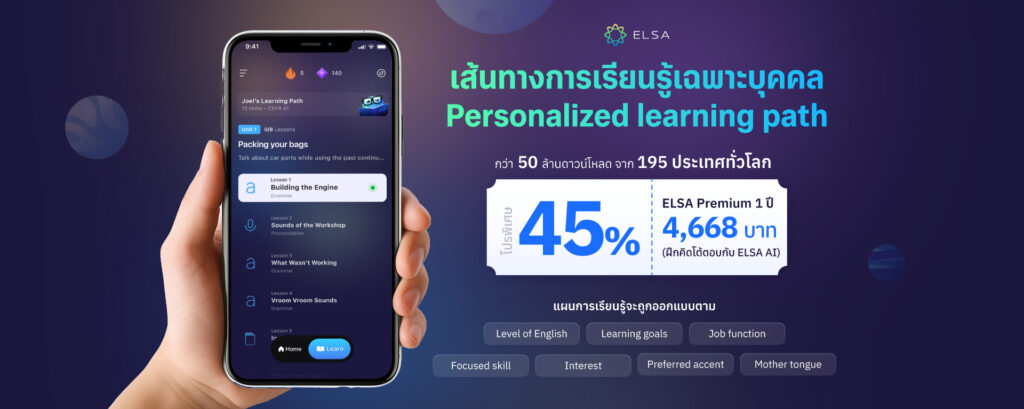
– Blue /bluː/ (adj): สีฟ้า
สีฟ้าภาษาอังกฤษคือ Blue /bluː/ จากการสำรวจ ในแผนภูมิสีภาษาอังกฤษทั้งหมด นี่เป็นสีที่คนทั่วโลกชื่นชอบมากที่สุด มันเป็นสัญลักษณ์ของความภักดี ความแข็งแกร่ง สติปัญญา และสันติภาพ เราสามารถเจอวลีที่เกี่ยวข้องกับสีน้ำเงินภาษาอังกฤษ เช่น “Blue blood” (บุคคลที่มีภูมิหลังของชนชั้นสูง) หรือ “Blue ribbon” (คุณภาพสูง ชนชั้นสูง)
– Green /griːn/ (adj): สีเขียว
สีนี้เป็นสัญลักษณ์ของการเติบโต ความสามัคคี ความปลอดภัย และความไว้วางใจ วลีและสำนวนภาษาอังกฤษบางคำที่เกี่ยวข้องกับสีนี้ เช่น “Give someone get the green light” (อนุญาตให้ใครบางคนทำบางสิ่ง “เปิดไฟเขียว”) หรือ “Green with envy” (อิจฉา)
– Yellow /ˈjel.əʊ/ (adj): สีเหลือง
สีเหลืองเป็นสีของสติปัญญาและความแข็งแกร่ง วลี “Have yellow streak” ในภาษาอังกฤษ หมายถึง “ขี้ขลาด คนที่ไม่กล้าทำอะไรเลย”
– Orange /ˈɒr.ɪndʒ/(adj): สีส้ม
ในแผนภูมิสีภาษาอังกฤษ สีส้มคือการผสมผสานระหว่างความแข็งแกร่งของสีแดงและความสุขของสีเหลือง มีความเกี่ยวข้องกับความขี้เล่น ความเบาๆ และความสดชื่น
– Pink /pɪŋk/ (adj): สีชมพู
สีชมพู หมายถึง ความโรแมนติก ความรัก ความห่วงใย วลีและสำนวนที่เกี่ยวข้องกับสีชมพู เช่น “Pink slip” (จดหมายไล่ออกจากงาน) หรือ “In the pink” (มีสุขภาพแข็งแรง)
– Gray /greɪ/ (adj): สีเทา
สีเทาภาษาอังกฤษคือ Gray /greɪ/ มันทำให้เกิดความเศร้าและมีความหมายเชิงปฏิบัติ วลีและสำนวนภาษาอังกฤษบางคำที่เกี่ยวข้องกับสีเทา เช่น “Grey matter” (สารสีเทา ภูมิปัญญา) หรือ “Gray-hair” (ผมหงอก)
– Red /red/ (adj): สีแดง
สีแดง หมายถึง ความแข็งแกร่ง พลัง ความมุ่งมั่น และความกระตือรือร้น นอกจากนี้ยังเป็นสัญลักษณ์ของการคุกคาม อันตราย และสงคราม วลีและสำนวนภาษาอังกฤษบางคำที่เกี่ยวข้องกับสีแดงในแผนภูมิสีภาษาอังกฤษ เช่น “Be in the red” (เป็นหนี้) หรือ “the red carpet” (พรมแดง)
– Black /blæk/(adj): สีดำ
ในภาษาอังกฤษ สีดำเป็นสัญลักษณ์ของความลึกลับ ความแข็งแกร่ง อำนาจ และสิ่งที่เป็นลบ วลีและสำนวนบางคำที่เกี่ยวข้องกับสีดำในภาษาอังกฤษ เช่น “Black mood” (อารมณ์เชิงลบ) หรือ “Black market” (ตลาดมืด)
– Brown /braʊn/ (adj): สีน้ำตาล
สีน้ำตาลภาษาอังกฤษ อ่านว่า Brown /braʊn/ สีน้ำตาลเป็นสัญลักษณ์ของความระมัดระวัง การปกป้อง ความสะดวกสบาย และความมั่งคั่งทางวัตถุ วลีและสำนวนที่เกี่ยวข้องกับสีน้ำตาล เช่น “To be browned off” (โกรธ เบื่อ)
– Purple /ˈpɜː(ɹ).pəl/ (adj): สีม่วง
สีม่วงภาษาอังกฤษ มักเป็นสัญลักษณ์ของความหรูหรา อำนาจ และความทะเยอทะยาน นอกจากนี้ยังเป็นสีของความคิดสร้างสรรค์ ภูมิปัญญา ความลึกลับ ความเป็นอิสระ และเวทมนตร์ เรามักจะเห็นวลี “Purple with rage” (โกรธจัดจนหน้าแดง) หรือ “Born to the Purple” (ชี้ผู้ที่เกิดในครอบครัวชนชั้นสูง)
>>> Read more
- ประโยคเงื่อนไข If Clause: โครงสร้าง วิธีใช้ แบบฝึกหัด และเคล็ดลับการท่องจำ
- บทกวีเกี่ยวกับการใช้ “IN” “ON” “AT” ช่วยให้คุณแยกแยะได้ง่า
- Passive Voice: สูตร ตัวแปร และการใช้งานที่แม่นยำที่สุด (พร้อมแบบฝึกหัด)
สูตรการผสมสีภาษาอังกฤษ
จริงๆ แล้วแผนภูมิสีภาษาอังกฤษไม่ได้มีแค่สีพื้นฐานเท่านั้น ด้วยการผสมสีเข้าด้วยกันทำให้เรามีสีภาษาอังกฤษอื่นๆ อีกมากมายนับไม่ถ้วน ต่อไปนี้คือสูตรการผสมสีพื้นฐานที่จะเป็นประโยชน์ในชีวิตคุณ
- Red + blue = violet
- Orange + blue = brown
- Red + Yellow = orange
- Red + green = brown
- Yellow + blue = green
เฉดสีในภาษาอังกฤษ
สีในภาษาอังกฤษยังแบ่งออกเป็นกลุ่มต่างๆ มากมาย เช่นเดียวกับในภาษาไทย นอกจากสีพื้นฐานแล้ว แผนภูมิสีภาษาอังกฤษยังมีสีต่างๆ มากมาย เช่น
- กลุ่มสีฟ้า – สีเขียว
Turquoise /ˈtɜː.kwɔɪz/: สีฟ้า
Dark Green /dɑːk griːn/: สีเขียวเข้ม
Light Blue /laɪt bluː/: สีฟ้าอ่อน
Navy /ˈneɪ.vi/: สีฟ้าเข้ม
Avocado /ævə´ka:dou/: สีเขียวเข้ม (สีเขียวอะโวคาโด)
Limon / laimən/: สีเขียวเข้ม (สีมะนาว)
Chlorophyll / ‘klɔrəfili /: สีเขียวคลอโรฟิลล์
Emerald / ´emərəld/: สีเขียวสดใส
Blue /bl:u/: สีฟ้า
Sky / skaɪ/: สีฟ้า
Bright blue /brait bluː/: สีฟ้าสดใส
Bright green /brait griːn/: สีเขียวสดใส
Light green /lait griːn /: สีเขียวอ่อน
Light blue /lait bluː/: สีฟ้าอ่อน
Dark blue /dɑ:k bluː/: สีฟ้าเข้ม
Dark green /dɑ:k griːn/: สีเขียวเข้ม
Lavender /´lævəndə(r)/: สีน้ำเงินตัดกับสีแดง
Pale blue /peil blu:/: สีฟ้าอ่อน
Sky – blue /skai: blu:/: สีฟ้า
Peacock blue /’pi:kɔk blu:/: สีน้ำเงินนกยูง
Grass – green /grɑ:s gri:n/: สีเขียว
Leek – green /li:k gri:n/: สีเขียวต้นหอม
Apple green /’æpl gri:n/: สีเขียวแอปเปิ้ล
- กลุ่มสีเหลือง
Melon /´melən/: สีเมล่อน
Sunflower / ´sʌn¸flauə/: สีเหลืองสดใส
Tangerine / tændʒə’ri:n/: สีส้มเขียวหวาน
Gold/ gold- colored: สีทอง
Yellowish / ‘jelouiʃ/: สีเหลืองอ่อน
Waxen /´wæksən/: สีเหลืองอมส้ม
Pale yellow /peil ˈjel.əʊ/: สีเหลืองอ่อน
Apricot yellow /ˈeɪ.prɪ.kɒt ˈjel.əʊ /: สีเหลืองอัลมอนด์ สีเหลืองแอปริคอต
- กลุ่มสีชมพู
Gillyflower / ´dʒili¸flauə/: สีชมพูสดใส (ดอกคาร์เนชั่น)
Baby pink /’beibi pɪŋk /: สีชมพูสดใส (ชื่อสีลิปสติกของผู้หญิง)
Salmon / ´sæmən/: สีชมพู-ส้ม
Pink red /pɪŋk red/: สีชมพูอมแดง
Murrey /’mʌri/: สีชมพูอมม่วง
Scarlet /’skɑ:lət/: บลัชออนสีชมพู สีชมพูมะม่วงหิมพานต์
Vermeil /’və:meil/: สีชมพูอมแดง
- กลุ่มสีแดง
Bright red /brait red /: สีแดงสด
Cherry /’t∫eri/: สีแดงเชอร์รี่
Wine /wain/: ไวน์แดง
Plum / plʌm/: สีแดงพลัม
Reddish /’redi∫/: สีแดงอ่อน
Rosy /’rəʊzi/: สีแดงกุหลาบ
- กลุ่มสีม่วง
Eggplant /ˈɛgˌplænt/: สีมะเขือ
Grape / greɪp/: สีม่วงเข้ม
Orchid /’ɔ:kid/: สีม่วงอ่อน
ส่วนสีอื่นๆ ก็มีหลายเฉดเหมือนกัน คุณจะต้องใช้เวลามากในการเป็นผู้เชี่ยวชาญในการจำชื่อสีภาษาอังกฤษ!
วิธีการใช้สีในประโยค
เราสามารถใช้แผนภูมิสีภาษาอังกฤษเพื่ออธิบายวัตถุ ปรากฏการณ์ สิ่งของ ฯลฯ ที่เราเห็นในประจำวัน ในประโยค คำที่เป็นสีมักจะทำหน้าที่เป็นคำคุณศัพท์หรือคำนาม บางครั้งก็ปรากฏในสำนวนหรือวลีที่มีความหมายโดยนัยเช่นตัวอย่างข้างต้น
อย่างไรก็ตาม สิ่งที่น่าสนใจอีกอย่างหนึ่งคือ สีในภาษาอังกฤษไม่ใช่แค่หมายความว่าสีเท่านั้น ถ้าคนไทยมักใช้คำว่า “ดำ” เพื่อหมายถึงความโชคร้าย ในภาษาอังกฤษก็เช่นเดียวกันนะ เจ้าของภาษามักจะพูดว่า “What a black day! My wallet is empty…” (ช่างเป็นวันมืดมนเสียนี่กระไร! กระเป๋าเงินของฉันว่างเปล่า…) หรือเจ้าของภาษายังใช้คำว่า แดง – red เพื่อแสดงความหงุดหงิด โมโหสุดขีด เมื่อพูดว่า “I’m red hot” (ฉันโกรธมาก)
สีที่ใช้ในประโยคภาษาอังกฤษไม่เพียงแต่เพื่ออธิบายเท่านั้น แต่ยังสื่อถึงความหมายโดยนัยด้วย รู้สิ่งนี้แล้วเมื่อเรียนสีภาษาอังกฤษ คุณจะสามารถแสดงออกได้อย่างชัดเจนยิ่งขึ้น มันจะน่าสนใจสำหรับเจ้าของภาษาที่จะพูดคุยกับคุณเพราะคุณจะได้ค้นพบภาษาลับของพวกเขา!
แบบฝึกหัดเกี่ยวกับคำศัพท์สีในภาษาอังกฤษ
แบบฝึกหัดที่ 1: เติมคำในช่องว่างให้ถูกต้อง
| ภาษาอังกฤษ | ออกเสียง | ประเภทของคำ | ภาษาไทย |
| White | /waɪt/ | (adj) | |
| สีฟ้า | |||
| สีเขียว | |||
| Yellow | /ˈjel.əʊ/ | (adj) | |
| สีชมพู | |||
| Orange | /ˈɒr.ɪndʒ/ | (adj) | |
| Gray | /greɪ/ | (adj) | |
| Red | /red/ | (adj) | |
| สีน้ำตาล | |||
| สีเบจ |
แบบฝึกหัดที่ 2: จงเติมความหมายที่ถูกต้องของวลีต่อไปนี้
- A white lie: ……………………………………………………
- As white as a ghost: ………………………………………..
- Like a red rag to a bull: …………………………………………….
- Catch somebody red-handed: ……………………………..
- Blue blood: …………………………………………………..
- Blue ribbon: ………………………………………………….
- Out of the blue: ………………………………………………
- Once in a blue moon: …………………………………………..
- Purple with rage: …………………………………………….
- Born to the purple: …………………………………………………..
เรียนภาษาอังกฤษได้ง่ายขึ้นด้วย ELSA Speak
เมื่อเรียนรู้แผนภูมิสีภาษาอังกฤษหรือหัวข้อคำศัพท์หรือไวยากรณ์อื่น ๆ คุณต้องมั่นใจในความถูกต้องและความเข้าใจอย่างถ่องแท้ และไม่มีใครสามารถเข้าใจภาษาอังกฤษได้ดีไปกว่าเจ้าของภาษา หากคุณต้องการเรียนภาษาอังกฤษกับครูเจ้าของภาษาที่มีคุณสมบัติเหมาะสมและมีประสบการณ์ ติดต่อกับ ELSA Speak เลยวันนี้!
“I threw the ball to him” หรือ “I threw the ball at him”?
มีความแตกต่างระหว่าง 2 ประโยคนี้หรือไม่? คำไหนคือคำบุพบทที่บอกทิศทาง คำไหนคือคำบุพบทที่บอกการเคลื่อนไหว
หากใช้เวลามากมายในการท่องจำหลักการใช้งาน preposition ในภาษาอังกฤษแล้ว แต่คุณยังสับสนว่าควรใช้ “to” หรือ “at” เชิญอ่านต่อได้เลยนะ ในบทความนี้ ELSA Speak จะช่วยให้คุณแยกแยะประเภทของ preposition ในภาษาอังกฤษและวิธีใช้ได้อย่างถูกต้องที่สุด!
รวบรวม preposition ที่ใช้บ่อยที่สุด
Preposition คือ อะไร?
Preposition คือ คำหรือวลีที่แสดงความสัมพันธ์ระหว่างคำนาม 2 คำในประโยค คำนามในที่นี้อาจจะเป็นบุคคล สิ่งของ สถานที่หรือเวลาก็ได้ คำบุพบทสามารถอยู่ในตำแหน่งต่างๆ ในประโยคได้ ขึ้นอยู่กับจุดประสงค์ในการใช้งาน ส่วนใหญ่ใช้นำหน้าคำนามหรือคำสรรพนาม
ในภาษาอังกฤษ Preposition คือ ส่วนหนึ่งที่มีหน้าที่ทางไวยากรณ์ ในทางที่น่าสนใจ Preposition คือ ชั้นกาวที่เชื่อมส่วนต่างๆ ของประโยค
บางที ในบางกรณี ผู้ฟังยังสามารถเข้าใจสิ่งที่คุณพูดได้หากคุณใช้คำบุพบทผิด แต่บางครั้งอาจจะทำให้ความหมายของประโยคเปลี่ยนไปโดยสิ้นเชิง ดังนั้น เพื่อที่จะเรียนรู้การสื่อสารภาษาอังกฤษด้วยตัวเองอย่างมีประสิทธิภาพ การเรียนรู้คำบุพบทจึงเป็นสิ่งที่ขาดไม่ได้
การจำแนก preposition ในภาษาอังกฤษ
Preposition มีอะไรบ้าง?
คำบุพบทในภาษาอังกฤษแบ่งออกเป็น 3 ประเภท ได้แก่ คำบุพบทที่บอกสถานที่ (preposition of place) คำบุพบทที่บอกเวลา (preposition of time) และคำบุพบทอื่นๆ
Preposition ที่ใช้บ่อยที่สุด 3 คำคือ in on at นี่คือคำบุพบท 3 คำที่สับสนง่ายที่สุด คำเหล่านี้เป็นคำบุพบททั่วไปที่บอกเวลาและสถานที่

คำบุพบทที่บอกเวลา (preposition of time)
| คําศัพท์ preposition | หลักการใช้งาน | ตัวอย่าง |
| In | 1. เดือนหรือปี | In May, in 2020 |
| 2. เวลาเฉพาะในวัน เดือน หรือปี | In the morning, in evening, in the 2nd week of June, in spring, in summer,… | |
| 3. ศตวรรษ หรือช่วงเวลาใดเวลาหนึ่งในอดีต อนาคต ฯลฯ | In the 21st century, in the early days, in the stone age, in the past, in the future,… | |
| On | 1. วันในสัปดาห์ | on Monday |
| 2. วัน | on the 5th of January, on February 9,… | |
| 3. วันที่ระบุ | on mom’s birthday, on Independence Day,… | |
| At | 1. ระบุเวลานาฬิกา | at 11 o’clock, at 5:19 AM |
| 2. เวลาที่สั้นและแม่นยำ | at night, at sunset, at lunchtime, at noon, at the moment,… |
คำบุพบทที่บอกสถานที่ (preposition of place)
| คําศัพท์ preposition | หลักการใช้งาน |
| In | 1. ตำแหน่งภายในพื้นที่สามมิติหรือพื้นที่ขอบเขต (ขอบเขตทางกายภาพหรือที่มองเห็นได้)ตัวอย่าง: In England/school/building/library/room/garden/car… |
| 2. แสดงทิศทางหรือตำแหน่งตัวอย่าง: in the North, in the middle,… | |
| On | 1. ตำแหน่งบนพื้นผิวของบางสิ่งบางอย่างตัวอย่าง: On the table/blackboard/page/map/wall/roof |
| 2. อยู่ในวลีระบุตำแหน่งตัวอย่าง: On the left, on the right,… | |
| At | ชี้ไปยังจุดใดจุดหนึ่ง หรือสถานที่ หรืออาคารที่มักมีกิจกรรมบางอย่างเกิดขึ้นตัวอย่าง: At the entrance/bus stop/station; At the bottom of glass,… |
นี่คือ Preposition 3 คำที่บอกเวลาและสถานที่ที่พบบ่อยที่สุด นอกจากนี้ยังมีคำบุพบทภาษาอังกฤษอื่น ๆ อีกมากมายที่มีหน้าที่คล้ายกัน (by, beside, after, before,…) คำบุพบทแต่ละคำมีการใช้งานที่แตกต่างกันขึ้นอยู่กับบริบท ดังนั้นจึงเป็นการยากที่จะแสดงรายการทั้งหมด
Preposition ทั่วไปคำอื่น ๆ
| เนื้อหา | คำบุพบท | หลักการใช้งาน | ตัวอย่าง |
| คำบุพบทที่บอกทิศทาง/การเคลื่อนไหวคำบุพบทเหล่านี้บอกทิศทาง การเคลื่อนไหว ไปที่ไหน หรือวางสิ่งของไว้ที่ใดที่หนึ่ง | to | ไป, มา (จากที่ไหนสักแห่ง) | Mary has gone to the zoo again. |
| in/into | เข้า (ข้างใน) | He put his hands in his pockets. A fly got into her soup while she was eating it. | |
| on/onto | เข้า (ด้านใน/ด้านบนของพื้นผิว) | Snow fell on the hillsI must have put the apple onto someone else’s bag in the market. | |
| from | จาก (ที่ไหนสักแห่ง) | A bear in the circus has escaped from his cage. | |
| away from | แสดงถึงการเคลื่อนที่ออกห่างจาก | They warned him to keep away from their daughter. | |
| คำบุพบทภาษาอังกฤษที่บอกตัวแทนคำบุพบทเหล่านี้แสดงถึงใครบางคนหรือบางสิ่งที่สร้าง/ทำให้เกิดบางสิ่ง/ปรากฏการณ์ ประโยคที่มีคำบุพบทที่บอกตัวแทนมักจะเขียนด้วย Passive voice | by | โดยบุคคล/สิ่ง/ปรากฏการณ์ | “The house was built by the two siblings.” (Passive voice)=> “The two siblings built the house.” (Active Voice) |
| with | ด้วย | “My heart is filled with emotion.” (Passive voice)=> “Emotion filled my heart.” (Active Voice) | |
| คำบุพบทภาษาอังกฤษที่บอกอุปกรณ์และเครื่องจักรคำบุพบทเหล่านี้หมายถึงเทคโนโลยี อุปกรณ์ หรือเครื่องจักรบางอย่างที่กำลังใช้อยู่ | by | การกระทำนั้นทำด้วยอะไร | “Aunt May returned home by car.” |
| with | “She opened the door with her key.” | ||
| on | “Can I finish my assignment on your laptop?” | ||
คำบุพบทภาษาอังกฤษที่บอกสาเหตุและวัตถุประสงค์คำบุพบทเหล่านี้อธิบายว่าทำไมสิ่งหรือปรากฏการณ์มีอยู่หรือเกิดขึ้น | for | เพื่อใคร/อะไร | “Everything he did was for you.” |
| through | ด้วย | “Through his bravery, I were able to escape safely.” | |
| because of | เพราะ | “Because of the delay, he was late for the meeting.” | |
| on account on | เพราะ | “The workers refused to work on account of the low wage.” | |
| from | จากใคร/อะไร | “I know from experience how to deal with him.” |

ข้อสังเกตบางประการเมื่อใช้ Prepositionในภาษาอังกฤษ
1. สามารถจบประโยคด้วย Preposition
ตามที่ระบุไว้ข้างต้น คำบุพบทมักจะนำหน้าคำนามหรือคำสรรพนาม แต่ไม่เสมอไป หลายคนเข้าใจผิดว่า การลงท้ายประโยคด้วยคำบุพบทโดยไม่มีคำนามหรือคำสรรพนามนั้นผิดหลักไวยากรณ์แล้ว แต่นั่นไม่เป็นความจริง
ตัวอย่าง:
This is something I can not agree with.
Where did you get this?
How many of you can she depend on?
2. หลักการใช้ preposition “like”
คำบุพบท “like” ได้ใช้เพื่อแสดงความหมายว่า “similar to” หรือ “similarly to” (คล้ายกัน คล้ายกับ) โดยปกติจะตามด้วยคำนาม นามวลี หรือกริยา ไม่ใช่คำนามและกริยา
ตัวอย่าง:
ประโยคที่ถูกต้อง:
You look like your mother.
ประโยคที่ใช้ผิด:
You look like your mother does.
3. แยกความแตกต่างระหว่าง “in” – “into” และ “on” – “onto”
“Into” และ “onto” มักจะใช้เพื่อเน้นการเคลื่อนไหว ในขณะที่ “in” และ “on” แสดงถึงตำแหน่ง
ตัวอย่าง:
She swam in the lake.
I walked into the hotel.
Look in the box. (Indicating location)
He drove into the city.
เนื่องจากการใช้คำบุพบทในภาษาอังกฤษบางครั้งคล้ายคลึงกัน จึงเกิดความสับสนได้ง่าย ดังนั้นวิธีเดียวคือต้องฝึกฝนให้มาก พบปะให้มาก และใช้ให้มากจึงจะสามารถแยกแยะได้
นอกจากนี้ หากต้องการเรียนรู้และจดจำคำบุพบทได้ง่ายขึ้น คุณควรเรียนรู้จากตัวอย่างที่เฉพาะเจาะจง
สร้างประโยคที่งี่เง่าหรือตลกที่สุดเท่าที่จะเป็นไปได้ โดยใช้คำที่ทำให้คุณประทับใจเพื่อจะจดจำได้นานขึ้น นี่เป็นวิธีการเรียนรู้ที่สามารถใช้กับเนื้อหาใดก็ได้ในภาษาอังกฤษ: คำศัพท์ โครงสร้างเเละไวยากรณ์ ฯลฯ อะไรก็ตามที่เกี่ยวข้องกับอารมณ์จะทำให้เราจำได้นานขึ้น
แบบฝึกหัดเกี่ยวกับการใช้ preposition ในภาษาอังกฤษ
แบบฝึกหัดที่ 1: เติมคำบุพบทในช่องว่างให้ถูกต้อง
1. Give it … your mom.
2. I was sitting … Mr. Brown and Mrs. Brown.
3. You cannot buy things … money.
4. I’ve got a letter … my boyfriend.
5. Is there any bridges … the river?
6. We cut paper … a pair of scissors.
7. An empty bottle was standing … the apple.
8. I am … breath after that run.
9. A pretty girl was walking … the road.
10. I sailed from my house … Brock.
11. Keep your hands … this hot plate.
12. The duck was fed … an old man.
13. We haven’t been to England … nine years.
14. I could not see her because he was sitting … me.
15. I met him … 1999.
คำเฉลย:
1. to 2. between 3. without 4. from 5. cross 6. with 7. beside 8. out of 9. by/on 10. to 11. away from 12. by 13. for 14. in front of 15. in
แบบฝึกหัดที่ 2: เลือกคำตอบที่ถูกต้อง
1. ….. time ….. time I will examine you on the work you have done.
A. From / to B. At / to C. In / to D. With / to
2. Hoa will stay there ….. the beginning in July ….. December.
A. from/ to B. till/ to C. from/ in D. till/ of
3. I would like to apply ….. the position of sales clerk that you advised in the Monday newspaper.
A. to B. for C. with D. in
4. Make a comment ….. this sentence!
A. to B. in C. on D. about
5. He’s a very wealthy man; a few hundred pounds is nothing ….. him.
A. for B. with C. to D. about
6. Meme is always busy ….. her work in the laboratory.
A. with B. at C. in D. of
7. The clerk ….. that counter said those purses were ….. sale.
A. in/ for B. at/ on C. at/ in D. on/ on
8. Don’t believe her! She just makes ….. the story.
A. of B. up C. out D. off
9. Old people like to descant ….. past memories.
A. in B. with C. on D. for
10. He should comply ….. the school rules.
A. to B. about C. with D. in
คำเฉลย:
1A: From ; 2A: From ; 3B: For ; 4C: On ; 5C: To
6A: With ; 7B: At/on ; 8B: Up ; 9C: On ; 10C: With
ด้านบนนี้ ELSA Speak ได้รวบรวมคำบุพบท (preposition) ในภาษาอังกฤษที่พบบ่อยที่สุดพร้อมกับแบบฝึกหัดบางส่วน คำบุพบทเป็นส่วนที่ยากและต้องใช้บ่อยเพื่อที่จะการจดจำได้ จงเตรียมสมุดบันทึกและจดโน้ตหลักการใช้คำบุพบททั้งหมดที่คุณเห็นว่าจำเป็นต้องนะ! ทุกครั้งที่คุณคิดว่า “เราสามารถจำได้ ไม่ต้องเขียน” อย่าหลงกลนะ จดโน้ตทุกอย่างเลยสิ เนื่องจากสมองของคุณไม่น่าเชื่อถืออย่างที่คุณคิดหรอก







